
オデッセウス
Odysseus
☆ ラエルテースとアンティクレアの子、ペネロペーの夫、テレマコスの父として知られるオデュッ セウスは、知性、狡猾さ、 多才(ポリトロポス)で知られ、そのため「賢謀のオデュッセウス(ギリシア語:μῆτις、翻字:mêtis、直訳:「賢謀」)」という異名で知られてい る。 オデュッセウスは、10年にわたるトロイ戦争の後、波乱に満ちた10年を過ごし、故郷に帰還したことで最も有名である(その長編叙事詩は「オデュッセイア」)。
☆
『イーリアス』の続編作品にあたり、そのため叙事詩環の一つに数えられることもある。長編叙事詩では、古代ギリシア文学最古期にあたる。
イタケーの王である英雄オデュッセウスがトロイア戦争の勝利の後に凱旋する途中に起きた、10年間にもおよぶ漂泊が語られ[1]、オデュッセウスの息子
テーレマコスが父を探す探索の旅も展開される。不在中に妃のペーネロペーに求婚した男たちに対する報復なども語られる[1]。
紀元前8世紀頃に吟遊詩人が吟唱する作品として成立し、その作者はホメーロスと伝承されるが、紀元前6世紀頃から文字に書かれるようになり、現在の24巻
からなる叙事詩に編集された。この文字化の事業は、伝承ではアテーナイのペリクレースに帰せられる。
古代ギリシアにおいては、ギリシア神話と同様に『オデュッセイア』と『イーリアス』は、教養ある市民が必ず知っているべき知識のひとつとされた。なお
『イーリアス』と『オデュッセイア』が同一の作者によるものか否かは長年の議論があるところであり、一部の研究者によって、後者は前者よりも遅く成立し、
かつそれぞれの編纂者が異なるとの想定がなされている。
★ホ
メーロスの叙事詩は、古代ギリシア文化成熟期前の先ギリシア文化とでも言うべき、「エーゲ海混成民族」の口伝として伝えられていた物語で、『吟遊詩人』が
詠唱する形であった。文学として綴られたのは上述の通りかなり後のことである。朗唱として「ムーサへの祈り」から始まり、ムーサ[注
1]に「伝えられるべき物語」を懇願する形式を取っている。懇願によってムーサ女神が、吟遊詩人の言葉を通じて「ある英雄」の話をヘクサメトロンの韻律で
人々に伝え語るのである。
☆
| 第1歌 |
|
| ムーサよ、あの男(トロイア戦争での英雄)の事を語ってください…』と懇願する形で始まり、 聴衆にこの物語が「イーリアス」と関係が深い事を示唆しながら興味を引くような形になっている。 場面は、「イーリアス」のトロイア戦争で活躍した英雄オデュッセウスが、女神カリュプソー(「隠す者」の意)の島に囚われているところからこの物語は始まる。 主神ゼウスはじめとするオリュンポスの神々のほとんどが「オデュッセウスを故郷のイタケーに帰郷させること」を決議するが、オデュッセウスに我が子ポリュ ペーモスの眼を潰された海神ポセイドーンのみはオデュッセウスに深い恨みを持ち続け、海路で帰途に就こうとするオデュッセウスに様々な困難をもたらす趣旨 が説明され、聴衆にオデュッセウスの帰路の旅が困難になるであろう事を前提で示しながら、また同時に英雄オデュッセウスに対してオリュンポスの神々が少な からず助力し「正しい行いをする者」を神々が憐み見放さない事を聴衆に暗示しつつ語りかけを成立させている。 先のトロイア戦争(「イーリアス」)で、奮戦したオデュッセウスは、彼の故郷イタケーでは「オデュッセウスは既に戦死したものと考えられており(既に数年 が経過している)」オデュッセウスの妻ペーネロペーの元には、オデュッセウスの莫大な財産とイタケーの支配を目論む40人の遺産目当ての求婚者たちがオ デュッセウス邸を占拠してたむろしていた。「オデュッセウスはイタケーの王であり、王の不在は国の不備」であるのが求婚者達の言い分である。オデュッセウ スの妻ペーネロペーは夫オデュッセウスの帰還を待ち続け、オデュッセウスが生きて帰ってきてくれる事を願っているが、悪辣な求婚者達の無道な振る舞い(オ デュッセウスの財産の蚕食)をさせるがままになっていた(古代ギリシアでは、有力者は客人を歓待するのが習わしであったが、王の不在をいいことに王宮で享 楽にふけり、文字通り財産を食い尽くさんとする所業は、アテーナーが指摘するように悪辣な行為である)。イタケーの王が不在の今、ペーネロペーには「オ デュッセウスが生きて帰ってきてくれる事を待ち続けるしかないのだが」、求婚者たちはそれを許さず「王の不在」を理由として早急に事態の解決を迫り、 「ペーネロペーが女の仕事、機織り(はたおり)の織物を完成させた暁には、(オデュッセウスの生還を諦め)求婚者たちの誰かと結婚する事を約束させた」。 こうしたオデュッセウス家の苦境に、天神ゼウスの使いとして現れた女神アテーナーは、父(オデュッセウス)を識る旧知の仲の友人として「異国の王・メン テース王」の姿に扮してテーレマコスの元を訪れる、メンテース王はオデュッセウス邸での現状についてテーレマコスに問い質す。「これは如何なる会食か?こ の者たちは如何なる理由でここにいるのか?このような傍若無人な振る舞いを心有るひとがみれば憤慨するに違いないでしょうに」と狼藉を許している現状を嘆 き、天行を説きつつ「そなたはもう子供ではなく立派な大人になったのだから、勇猛な父に恥じぬような行いをしなければならない。まずは父上の行方を探し生 死を確認してから、もし亡くなられていたのならば立派な葬儀を執り行い、母上を再婚させればよろしかろう、」「そして万事を成し遂げたらならば、貴方自身 の大義も成された方がよかろう、慎重に心に秘して」と叱咤激励しつつ「父オデュッセウスを探す旅に出る事を述べ」ひとまずこの場を去った。テーレマコスは 寝床につきながら異国の客人メンテース王に言われた「父を探す旅」について思いをめぐらすのであった。 |
|
| 第2歌 |
|
| オ
デュッセウスが死んだと考えられているイタケーでは、オデュッセウスの妻ペーネロペーのところに、40人の求婚者が遺産目当てに言い寄って数年が経ってい
た。オデュッセウスの妻ペーネロペーの実子であるテーレマコスは、母の苦境とオデュッセウス家の窮状を救うべく決心し、イタケーの衆を集め求婚者達の横道
ぶりを皆に訴えた、しかしテーレマコスの訴えは憐みを得たがすぐに求婚者たちの非難の声にかき消され、テーレマコスの訴えは虚しく終わる。ここにきてイタ
ケーの衆の意を得られねかったテーレマコスは意を決し、父の行方を探す望み薄き危険な旅に出る事を決意する。この時テーレマコスは屋敷や町の者たちに自分
を養育してくれた恩義を述べつつもオデュッセウス邸での非道ぶりに対して正義が糺されると宣言し、悪辣な求婚者たちへの敵対を表明する。求婚者たちは将来
の憂いになるテーレマコスの除外も相談するが、女神アテーナーの助けを借りて、テーレマコスは無事に父の行方を探す旅に出立する。 |
|
| 第3歌 |
|
| テー
レマコスはまずイタケー島を出てピュロスに着き、同じアカイア人で武勇の名高いネストール王に会う。王はおりしも海神ポセイドーンへ生贄を捧げる祭祀の途
中であったが、訪れてきた旅の若者を快く迎え儀礼に加えて歓待してくれた。古代ギリシアではゼウスは旅人の守護神でもあり、自身も艱難を経てトロイア戦争
から帰国出来たネストール王は儀礼を尽くしてテーレマコスを歓待し、またテーレマコスも儀礼をもって王に答えた。この礼儀を弁えた若者に対して、王はトロ
イア戦争が9年の長きに及び多くの英雄たちさえも失った事を語りだす。そしてこのトロイア戦争に戦況を打開して戦に終止符を打ったのが知略の人・オデュッ
セウスであったと讃嘆し、戦争が終結しアカイア人の武将たちの多くが帰郷の際に亡くなった事告げる。が、肝心のオデュッセウスの行方はネストール王にも判
らず、ネストール王が帰郷の際に神々への祭祀を怠りさまざまな海難に有った事をテーレマコスに語る(だからこそ祭祀を怠らず、テーレマコスを歓待している
故を旅の話で語る)。オデュッセウスの生死については自分は判らないが海神の翁(ポセイドーンとは別の海神)に助けられた際に、この翁が言うには「オ
デュッセウスはカリュプソーの島に囚われているらしい」との伝聞をネストール王に語ってくれた。こうしてネストール王の帰国の艱難の帰路と、王の中の王
「アガメムノーン王」がアイギストスに謀殺されたことを話し、漂流の間にアガメムノーンの仇を討つことを誓うが、帰国が叶ったおりに、アガメムノーン王の
息子オレステースが父の仇アイギストスを見事討ち果たし後世に名を残す勇名を得た事をテーレマコスに語る。これはテーレマコスに対してもこれを見習い青年
よ大義を成せとの激励の示唆なのであるが、テーレマコスは礼儀を持って返答しつつ「私にはそのような大事を成せる自信がない」と弱音を漏らす。ここで女神
アテーナーはメントス王の姿を借りて弱音を吐くテーレマコスを叱責する。このような話の流れから、ネストール王は戦友オデュッセウスの息子に力を貸し、彼
の息子たちにテーレマコスに助力する事を命じ、ネストール王の子息と壮麗な車を従わせスパルタのメネラーオス王に送った。 |
|
| 第4歌 |
|
| 第5歌 |
|
| ポセイドーンの怒りを買い、イタケーに還れずにいるオデュッセウスに対
して、他の神々は同情的である。ポセイドーンがアイティオピアーの宴席に赴いており、オリュンポスに不在である隙を見て、アテーナーは、大神ゼウスに嘆願
し、オデュッセウスの帰国の許しを得る。神々の王ゼウスは、伝令使ヘルメースをカリュプソーの島に赴かせ、オデュッセウスを出立させる。しかし、その帰国
を快く思わないポセイドーンは、オデュッセウスのいかだを三叉矛で難破させる。数日後、オデュッセウスは、海岸に流れ着き、オリーブの茂みで眠りにつく。 |
ポセイドーンの怒り ポセイドーンは、海の女神とアテーナーの支援を受けて順調に故郷へと船を進めるオデュッセウスを視認すると、怒りで胸を焦がした。息子であるポリュペーモ スの眼を潰された怒りが収まっていなかったポセイドーンは、三叉の矛を海に突き刺し、嵐を巻き起こしてオデュッセウスの船を破壊した。大波に呑み込まれた オデュッセウスは死を覚悟するが、海の女神レウコテアーがこれを哀れみ、着けたものは決して溺死することのない魔法のスカーフを彼に授けた。オデュッセウ スはそれを着け、海中に潜ってポセイドーンの怒りをやり過ごした。ポセイドーンが去った後、アテーナーが風を吹かし、海上に漂うオデュッセウスをパイアー ケス人の国へと運んでいった[10]。 |
| 第6歌 |
|
| 難破したオデュッセウスを海岸で助けたのは、パイアーケス人の王アルキノオスの王女ナウシカアーであった。 |
ナウシカアーとの出会い(第6歌〜第8歌)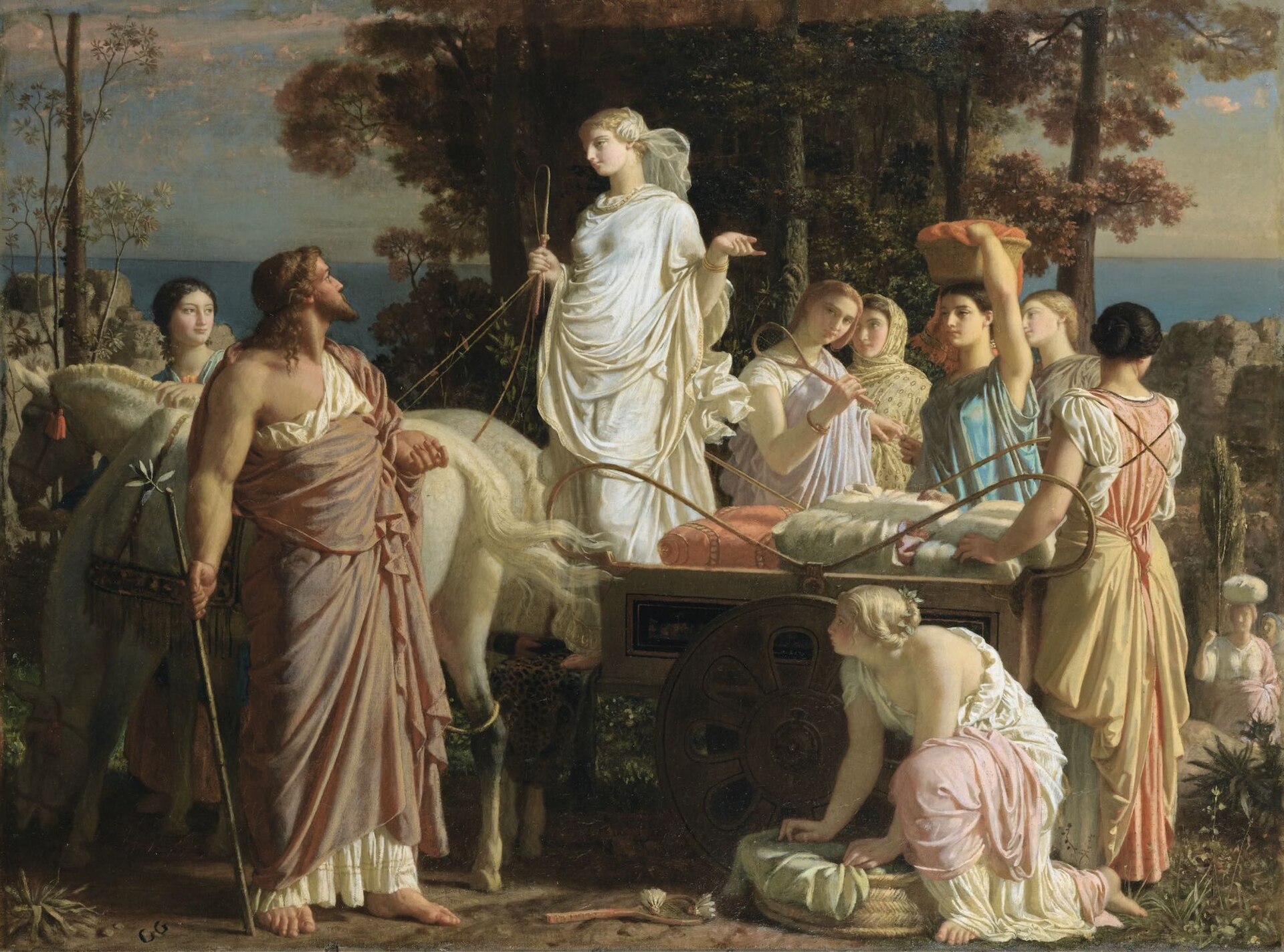 オデュッセウスとナウシカアー オデュッセウスは浜辺へと打ち上げられ、そこでパイアーケス人の王女であるナウシカアーと出会った。彼女はオデュッセウスをパイアーケス人の王宮へと招き 入れた。アテーナーの手引きもあって、パイアーケス人の王はオデュッセウスに帰郷のための船を提供することを約束すると、競技会や酒宴を開いた。そこで吟 遊詩人がトロイア戦争の栄光の物語を語り、オデュッセウスは思わず涙を流してしまう。オデュッセウスは自らの名や身分を明かし、今までの苦難や数々の冒険 譚を語り始めるのであった[11] |
| 第7歌 |
|
| ナウシカアー姫は父王の元に案内する。 |
|
| 第8歌 |
|
| 翌日は祝日になり、アルキノオス王の宴でオデュッセウスは楽人デーモドコスが歌うトロイア戦争の物語を聞き、密かに涙する。王は、オデュッセウスの素性を尋ねる。 |
|
| 第9歌 |
|
| オデュッセウスは、自分の素性を話し、今までの長旅について話し始める。イスマロス(英語版)の町、ロートパゴイ族、キュクロープスの話をする。 |
ロートパゴス族 リュビアの西部に住んでいたロートパゴス族は、ロートスの木というナツメに似た木の果実を食べて生活していた。漂着した土地を探索していたオデュッセウス の部下たちはロートパゴス族と遭遇し、彼らからロートスの果実(一説には花)をもらって食した。すると、ロートスがあまりに美味だったので、それを食べた 部下はみなオデュッセウスの命令も望郷の念も忘れてしまい、この土地に住みたいと思うようになった。ロートスの果実には食べた者を夢の世界に誘い、眠るこ と以外何もしたくなくなるという効力があった。このためオデュッセウスは嫌がる部下たちを無理やり船まで引きずって行き、他の部下がロートスを食べないう ちに出航した[6]。 キュクロープスの島 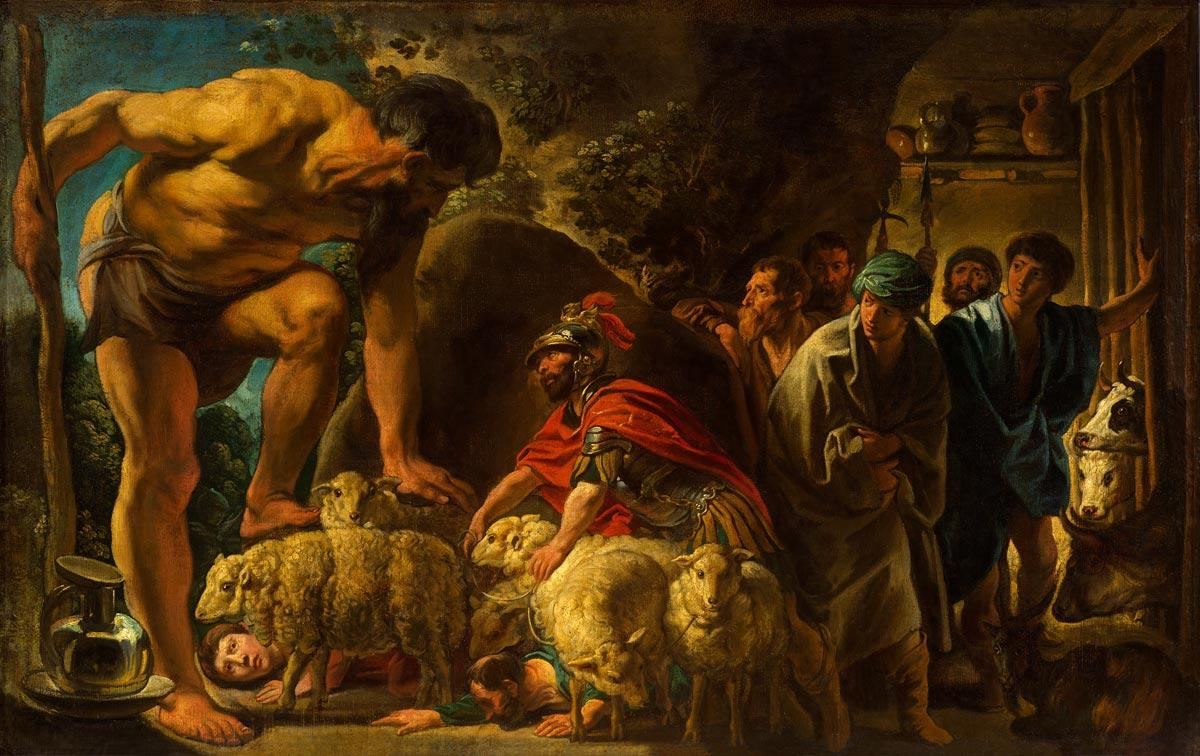 『ポリュフェモスの洞窟のオデュッセウス』ヤーコブ・ヨルダーンス、17世紀初頭 オデュッセウス一行が1つ目の巨人キュクロープスたちの住む島に来た時、彼らはキュクロープスのポリュペーモスによって洞窟に閉じ込められた。部下たちが 2人ずつ食べられていくうち、オデュッセウスは持っていたワインをポリュペーモスに飲ませて機嫌を取った。これに気をよくしたポリュペーモスは、オデュッ セウスの名前を尋ね、オデュッセウスが「ウーティス」(「誰でもない」の意)と名乗ると、ポリュペーモスは「おまえを最後に食べてやろう」と言った。 ポリュペーモスが酔い潰れて眠り込んだところ、オデュッセウスは部下たちと協力してポリュペーモスの眼を潰した。ポリュペーモスは大きな悲鳴を上げ、それ を聞いた仲間のキュクロープスたちが集まってきたが、誰にやられたと聞かれてポリュペーモスが「ウーティス(誰でもない)」と答えるばかりであったため、 キュクロープスたちは皆帰ってしまった。 オデュッセウスたちは羊の腹の下に隠れて洞窟を脱出し、船に戻って島から離れた。この時、興奮したオデュッセウスが本当の名を明かしてキュクロープスを嘲 笑したため、ポリュペーモスはオデュッセウスに罰を与えるよう父ポセイドーンに祈り、以後ポセイドーンはオデュッセウスの帰還を何度も妨害することになっ た。ポリュペーモスがオデュッセウスによって眼を潰されることは、エウリュモスの子テーレモスによって予言されていたという[7]。 |
| 第10歌 |
|
| アイオロスの風によって帰路に就こうとするが、船員が誤って風の袋を開
け、来た方角に押し戻される。アイアイエー島の魔女キルケーに船員は豚にされてしまう。オデュッセウスは、ヘルメースに授けられた魔法を防ぐハーブ・モー
リュにより助かる。キルケーは、オデュッセウスがオーケアノスを越えて、冥界に行かなければいけないことを話す。 |
|
| 第11歌 |
|
| 第11歌は「ネキュイア」(Nekyia)として知られる。 ヘーラクレースのジブラルタル海峡を越えて冥界に行く、母アンティクレイアの幽霊やトロイア戦争で死んだ兵士の幽霊に会う。また、預言者テイレシアースに会う。 |
|
| 第12歌 |
|
| オデュッセウスの航海と冒険の話の続き。キルケーの館より出て、仲間た
ちと船を進ませる途中、セイレーネス(セイレーンたち)という人の顔を持ち鳥の身体を持つ怪物がいる島の傍らを船は通過する。セイレーンたちの歌を聴いた
者は、すべての記憶を失い、怪物セイレーンに近づきその餌食とされる。しかし、オデュッセウスは、その歌が聞きたく、仲間たちの耳は蜜蝋で塞ぎ、自分は帆
柱に縛り付けもらい、身動きできないようにして、無事通過する。オデュッセウスは、セイレーンの島に進むのだと叫ぶが、仲間たちは歌もその言葉も聞こえな
いので、そのまま無視して進んだ。 次に、怪物スキュラのいる岩の横を通過する。スキュラは、六本の頭で仲間たち六人をくわえて捉えむさぼり食うが、オデュッセウスを初め、他の仲間は何とか無事にスキュラの岩の傍らを通過できた。 それから、さらにヘーリオスの家畜がいる、トリーナキエー島に一行は上陸する。オデュッセウスは、あらかじめに警告を受けていたので上陸を止めたが、仲間 たちが上陸すると云って聞かず、やむをえず上陸する。すると、やはり凶事は起こり、部下がヘーリオスの家畜をみだりに殺し食用にしたため、家畜を世話して いたヘーリオスの娘ラムペティエーはそのことを父に知らせた。ヘーリオスは、怒ってゼウスに訴えたので、ゼウスは船に雷を落とした。彼らの船は再びスキュ ラの岩とカリュブディスの近くに流され、今度は、大渦巻きですべてを飲み込むカリュブディスの岩の下の海に吹き寄せられた。船は仲間を含めて渦巻きに飲み 込まれたが、オデュッセウスだけは助かり、カリュプソーの島に流れ着いた。 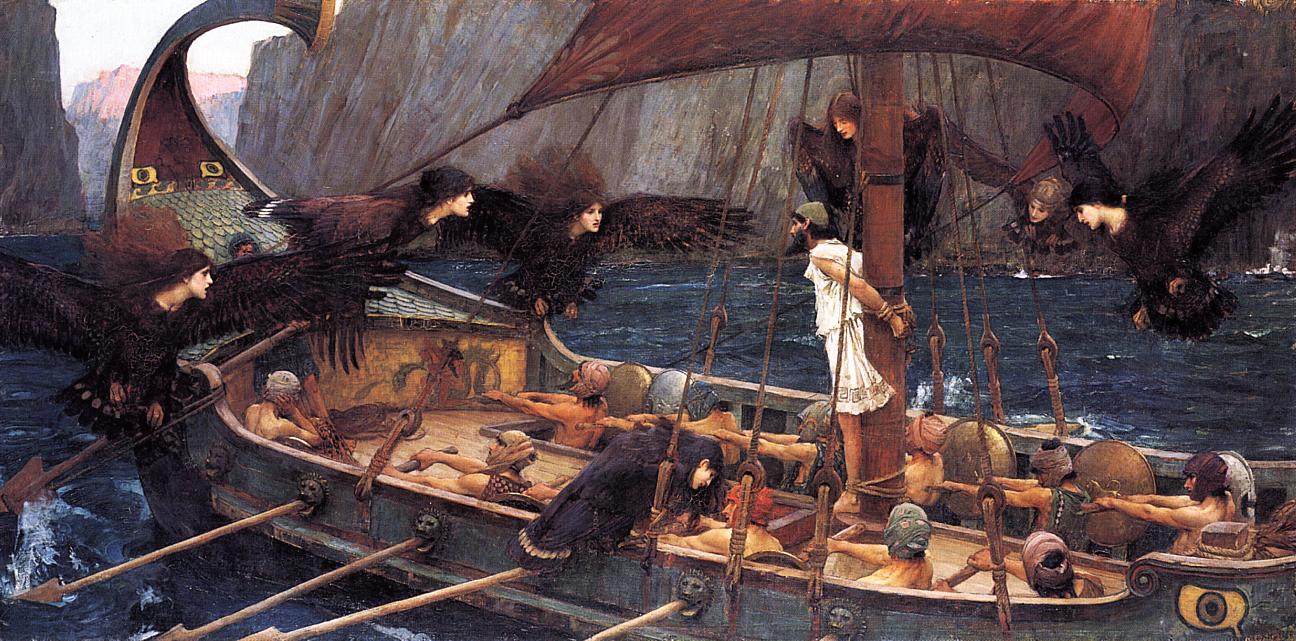 |
ヘーリオスの怒り スキュラの海峡を乗り切ったオデュッセウス一行は、イタリア南岸にあるトリーナキエー島に辿り着いた。この島では太陽神ヘーリオスが家畜を飼育しており、 テイレシアースからも「トリーナキエー島はあまりにも危険であるから立ち寄るべきではない。立ち寄ってしまっても、決して太陽神の家畜には手を出すな」と 忠告されていた。しかし、部下があまりにも疲れ切っていたので、仕方が無く休息の為に上陸することになってしまった。この時、嵐によって一ヶ月も出航でき なくなってしまい、食料が尽きてしまった。空腹に耐えかねた部下の一人がヘーリオスの家畜に手を出してしまい、立派な牛を殺して食べてしまった。 これに怒り狂ったヘーリオスは、神々の王ゼウスに船を難破させるように頼んだ。ゼウスは嵐を呼び、やっと出航できたオデュッセウスの頑強な船を雷霆によっ て粉砕した。船は裂け、船員たちは海に投げ出された。オデュッセウスは大波に流されながらも、岩にしがみついた。すると、渦潮によって獲物を喰らう怪物カ リュブディスによって船の残骸が丸呑みされるのを目撃した。カリュブディスは船の竜骨を吐き出し、オデュッセウスはそれにしがみついて、九日間も海を漂流 する運命になった。部下は全員死亡した[9]。  |
| 第13歌 |
|
| オデュッセウスの話は終わり、アルキノオス王は彼にイタケーに帰るように話し、オデュッセウスはアルキノオスから魔法の船を借り、イタケーへ船出し帰還する。アテーナーは、彼を老人に変装させる。 |
|
| 第14歌 |
|
| 豚飼いのエウマイオスは、素性を明かしていないオデュッセウスを歓待する。 |
|
| 第15歌 |
|
| アテーナーは、テーレマコスに故郷に帰るように言う。 |
|
| 第16歌 |
|
| テーレマコスがイタケーに帰ると、アテーナーはオデュッセウスを元の姿に戻す。オデュッセウスは、テーレマコスと再会する。2人は計略を練り、オデュッセウスが死んだと偽る。 |
|
| 第17歌 | |
| アテーナーは再びオデュッセウスを乞食の姿に戻し、彼は街へ帰る。 |
|
| 第18歌 | |
| 求婚者は、オデュッセウスの鍛えられた筋肉に驚く。 |
|
| 第19歌 |
|
| オデュッセウスはペーネロペーと長く話すが、素性は明かさない。かつての乳母エウリュクレイアは、膝の傷から彼がオデュッセウスであることに気付く。 |
|
| 第20歌 | |
| ゼウスは、青空に雷を落とす。 |
|
| 第21歌 |
|
| ペーネロペーは、オデュッセウスの弓を持ち、「この強弓を扱える者と私は結婚する」と告げる。求婚者は、次々と試すが失敗、その日がアポローンの祭日であった為に、献酒する。オデュッセウスは弓で、矢を12本の斧の穴に通す。 |
|
| 第22歌 |
第22歌・第23歌 |
| オデュッセウスは首謀者アンティノオスの喉を矢で射抜き、息子や家来と共に他の求婚者たちをすべて討ち果たす。次いで、オデュッセウスを裏切った侍女たちを絞首刑に処し、メランティオスを殺す。 |
パ
イアーケス人のおかげでオデュッセウスは故郷へと帰国することができた。故国イタケーでは、妻ペーネロペーに多くの男たちが言い寄り、その求婚者たちはオ
デュッセウスをもはや亡き者として扱い、彼の領地をさんざんに荒していた。オデュッセウスはすぐに正体を明かすことをせず、アテーナーの力でみすぼらしい
老人に変身すると、好き放題に暴れていた求婚者たちを懲らしめる方法を考えた。ペーネロペーは夫の留守の間、なんとか貞操を守ってきたが、それももう限界
だと思い、「オデュッセウスの強弓を使って12の斧の穴を一気に射抜けた者に嫁ぐ」と皆に知らせた。老人に変身していたオデュッセウスはこれを利用して求
婚者たちを罰しようと考えた。 求婚者たちは矢を射ろうとするが、あまりにも強い弓だったため、弦を張ることすらできなかった。しかし、老人に変身したオデュッセウスは弓に弦を華麗に 張ってみせ、矢を射て12の斧の穴を一気に貫通させた。そこで正体を現したオデュッセウスは、その弓矢で求婚者たちを皆殺しにした。求婚者たちも武装して 対抗しようとしたが、歯が立たなかった。こうして、求婚者たちは死に、その魂はヘルメースに導かれて冥界へと下って行った。 ペーネロペーは、最初のうちはオデュッセウスのことを本物かどうか疑っていたが、彼がオデュッセウスしか知りえないことを発言すると、本物だと安心して泣き崩れた。こうして、二人は再会することができたのである[12]。 |
| 第23歌 |
|
| オデュッセウスは、ペーネロペーに冒険談を話す。 |
|
| 第24歌 |
|
| オデュッセウスは、父ラーエルテースと再会する。求婚者の親族が復讐しようとするが、アテーナーが仲裁する。 |
https://x.gd/oi5ph |
☆
| In Greek and Roman
mythology, Odysseus
(/əˈdɪsiəs/ ə-DISS-ee-əs;[1] Greek: Ὀδυσσεύς, Ὀδυσεύς, translit.
Odysseús, Odyseús, IPA: [o.dy(s).sěu̯s]), also known by the Latin
variant Ulysses (/juːˈlɪsiːz/ yoo-LISS-eez, UK also /ˈjuːlɪsiːz/
YOO-liss-eez; Latin: Ulysses, Ulixes), is a legendary Greek king of
Ithaca and the hero of Homer's epic poem the Odyssey. Odysseus also
plays a key role in Homer's Iliad and other works in that same epic
cycle.[2] As the son of Laërtes and Anticlea, husband of Penelope, and father of Telemachus, Acusilaus, and Telegonus,[3] Odysseus is renowned for his intellectual brilliance, guile, and versatility (polytropos), and he is thus known by the epithet Odysseus the Cunning (Greek: μῆτις, translit. mêtis, lit. "cunning intelligence"[4]). He is most famous for his nostos, or "homecoming", which took him ten eventful years after the decade-long Trojan War.[5] Name, etymology, and epithets The form Ὀδυσ(σ)εύς Odys(s)eus is used starting in the epic period and through the classical period, but various other forms are also found. In vase inscriptions, we find the variants Oliseus (Ὀλισεύς), Olyseus (Ὀλυσεύς), Olysseus (Ὀλυσσεύς), Olyteus (Ὀλυτεύς), Olytteus (Ὀλυττεύς) and Ōlysseus (Ὠλυσσεύς). The form Oulixēs (Οὐλίξης) is attested in an early source in Magna Graecia (Ibycus, according to Diomedes Grammaticus), while the Greek grammarian Aelius Herodianus has Oulixeus (Οὐλιξεύς).[6] In Latin, he was known as Ulixēs or (considered less correct) Ulyssēs. Some have supposed that "there may originally have been two separate figures, one called something like Odysseus, the other something like Ulixes, who were combined into one complex personality."[7] However, the change between d and l is common also in some Indo-European and Greek names,[8] and the Latin form is supposed to be derived from the Etruscan Uthuze (see below), which perhaps accounts for some of the phonetic innovations. The etymology of the name is unknown. Ancient authors linked the name to the Greek verbs odussomai (ὀδύσσομαι) "to be wroth against, to hate",[9] to oduromai (ὀδύρομαι) "to lament, bewail",[10][11] or even to ollumi (ὄλλυμι) "to perish, to be lost".[12][13] Homer relates it to various forms of this verb in references and puns. In Book 19 of the Odyssey, where Odysseus' early childhood is recounted, Euryclea asks the boy's grandfather Autolycus to name him. Euryclea seems to suggest a name like Polyaretos, "for he has much been prayed for" (πολυάρητος) but Autolycus "apparently in a sardonic mood" decided to give the child another name commemorative of "his own experience in life":[14] "Since I have been angered (ὀδυσσάμενος odyssamenos) with many, both men and women, let the name of the child be Odysseus".[15] Odysseus often receives the patronymic epithet Laertiades (Λαερτιάδης), "son of Laërtes". It has also been suggested that the name is of non-Greek origin, possibly not even Indo-European, with an unknown etymology.[16] Robert S. P. Beekes has suggested a Pre-Greek origin.[17] In Etruscan religion the name (and stories) of Odysseus were adopted under the name Uthuze (Uθuze), which has been interpreted as a parallel borrowing from a preceding Minoan form of the name (possibly *Oduze, pronounced /'ot͡θut͡se/); this theory is supposed to explain also the insecurity of the phonologies (d or l), since the affricate /t͡θ/, unknown to the Greek of that time, gave rise to different counterparts (i. e. δ or λ in Greek, θ in Etruscan).[18] In the Iliad and Odyssey Homer uses several epithets to describe Odysseus, starting with the opening, where he is described as "the man of many devices" (in the 1919 Murray translation). The Greek word used is polytropos, literally the man of many turns, and other translators have suggested alternate English translations, including "man of twists and turns" (Fagles 1996) and "a complicated man" (Wilson 2018). |
ギリシア神話およびローマ神話にお
いて、オデュッセウス(/əˈdɪsiəs/ ə-DISS-ee-əs;[1] Greek: Ὀδυσσεύς, Ὀδυσεύς,
translit. Odysseús, Odyseús, IPA:
[o.dy(s).sěu̯s])、ラテン語形のユリシーズ(/juːˈlɪsiːz/ yoo-LISS-eez、英国では
/ˈjuːlɪsiːz/
YOO-liss-eez;ラテン語:ユリシーズ、ウリクセス)としても知られ、ホメーロスの叙事詩『オデュッセイア』の英雄であり、イサカの伝説上のギ
リシア王である。オデュッセウスはホメーロスの『イーリアス』やその他の作品でも重要な役割を果たしている。[2] ラエルテースとアンティクレアの子、ペネロペーの夫、テレマコスの父として知られるオデュッセウスは、知性、狡猾さ、 多才(ポリトロポス)で知られ、そのため「賢謀のオデュッセウス(ギリシア語:μῆτις、翻字:mêtis、直訳:「賢謀」)」という異名で知られてい る。 オデュッセウスは、10年にわたるトロイ戦争の後、波乱に満ちた10年を過ごし、故郷に帰還したことで最も有名である。 名前、語源、異名 Ὀδυσ(σ)εύς(オデュッセウス)という形は叙事詩の時代から古典時代にかけて使われたが、他にも様々な形が見られる。壺の銘文では、 Oliseus(Ὀλισεύς)、Olyseus(Ὀλυσεύς)、Olysseus(Ὀλυσσεύς 、Olytteus (Ὀλυττεύς)、Ōlysseus (Ὠλυσσεύς) などの形も見られる。Oulixēs (Οὐλίξης)という形は、マグナ・グラエキアの初期の資料(ディオメデス・グラマティクスによるイビュコスのもの)で確認されているが、ギリシアの 文法学者エリウス・ヘロディアヌスはOulixeus (Οὐλιξεύς)としている。[6] ラテン語では、彼はUlixēsまたは(あまり正しくないとされる)Ulyssēsとして知られていた。「もともと2人の別々の人物がおり、1人はオ デュッセウス、もう1人はウリクセスと呼ばれていたが、それが1つの複雑な人格に統合されたのではないか」という説もある[7]。しかし、dとlの変化 は、いくつかのインド・ヨーロッパ語族やギリシア語の名前にも見られるものであり[8]、ラテン語の形はエトルリア語のUthuze(下記参照)に由来す ると考えられており、おそらくこれが音韻の革新のいくつかを説明している。 この名前の語源は不明である。古代の著述家たちは、この名前をギリシャ語の動詞 odussomai (ὀδύσσομαι) 「憤慨する、憎む」[9]、oduromai (ὀδύρομαι) 「嘆く 、嘆く」[10][11]、あるいは「滅びる、失われる」[12][13]という意味のollumi (ὄλλυμι) というギリシャ語に由来するのではないかという説もある。ホメーロスは、参考文献や言葉遊びの中で、この動詞のさまざまな形に関連付けている。オデュッセ ウスの幼少期が描かれた『オデュッセイア』第19巻では、エウリュクレアが少年の祖父であるアウトリュコスに名前を付けるよう頼む。エウリュクレアは「彼 のために多くの祈りが捧げられた」という意味のポリアレトス(πολυάρητος)のような名前を提案したようだが、どうやら皮肉な気分だったらしい オートリコスは、その子に「自分の人生経験」を記念する別の名前を与えることにした。(ὀδυσσάμενος odyssamenos)多くの男女に腹を立てているので、子供の名前をオデュッセウス(Odysseus)としよう」と決めた。[15] オデュッセウスはしばしば「ラエルテースの息子」を意味するラエルティアーデス(Λαερτιάδης)という父称を伴う。 また、この名前はギリシア語以外の起源であり、インド・ヨーロッパ語族に属さない可能性もあるという説もあり、語源は不明である。[16] ロバート・S・P・ビークスは、この名前はギリシア語以前の起源であると示唆している。[17] エトルリアの宗教では、オデュッセウスの名前(および物語)はウトゥゼ(Uθuze)という名前で採用された。これは、 先行するミノア語の形(おそらく*Oduze、/'ot͡θut͡se/と発音される)からの借用であると解釈されている。この説は、音韻(dまたはl) の不安定さも説明できるとされている。なぜなら、当時のギリシア語では知られていなかった破擦音/t͡θ/は、異なる対応物(すなわち、ギリシア語ではδ またはλ、エトルリア語ではθ)を生み出したからである。[18] ホメロスは『イーリアス』と『オデュッセイア』において、冒頭で「多くの策略を持つ男」と表現されているオデュッセウスを描写するために、いくつかの形容 詞を使用している(1919年のマレー訳)。使用されているギリシャ語は「polytropos」で、文字通り「多くの変化を持つ人」を意味する。他の翻 訳者たちは、「man of twists and turns」(Fagles 1996)や「a complicated man」(Wilson 2018)など、別の英訳を提案している。 |
| Description In the account of Dares the Phrygian, Odysseus was illustrated as "tough, crafty, cheerful, of medium height, eloquent, and wise."[19] Genealogy Relatively little is given of Odysseus' fictional background other than that according to Pseudo-Apollodorus, his paternal grandfather or step-grandfather is Arcesius, son of Cephalus and grandson of Aeolus, while his maternal grandfather is the thief Autolycus, son of Hermes[20] and Chione. Hence, Odysseus was the great-grandson of the Olympian god Hermes. According to the Iliad and Odyssey, his father is Laertes[21] and his mother Anticlea, although there was a non-Homeric tradition[22][23] that Sisyphus was his true father.[24] The rumour went that Laërtes bought Odysseus from the conniving king.[25] Odysseus is said to have a younger sister, Ctimene, who went to Same to be married and is mentioned by the swineherd Eumaeus, whom she grew up alongside, in book 15 of the Odyssey.[26] Odysseus himself, under the guise of an old beggar, gives the swineherd in Ithaca a fictitious genealogy: "From broad Crete I declare that I am come by lineage, the son of a wealthy man. And many other sons too were born and bred in his halls, true sons of a lawful wife; but the mother that bore me was bought, a concubine. Yet Castor, son of Hylax, of whom I declare that I am sprung, honored me even as his true-born sons."[27] |
説明 フリギアのダレスの物語では、オデュッセウスは「タフで狡猾、陽気で中背、雄弁で賢明」と描写されている。 系図 プセウド・アポロドロスの記述によると、オデュッセウスの父方の祖父または継祖父はケファロスの息子でエオロスの孫であるアルケシオスであり、母方の祖父 はヘルメスの息子でキオネの息子である盗賊オルトリコスである。したがって、オデュッセウスはオリンポスの神ヘルメスの曾孫であった。 『イーリアス』と『オデュッセイア』によると、父親はラエルテース[21]、母親はアンティクレアであるが、シシュフォスが本当の父親であるという非ホメ ロス的伝承も存在する[22][23]。ラエルテースが策略家の王からオデュッセウスを買い取ったという噂もある[25]。 妹のクティメネはサメで結婚したと言われており、オデュッセウスは妹について、オデュッセイア第15巻で、共に育った豚飼いのエウマイオスに言及してい る。オデュッセウス自身は、年老いた乞食に扮してイサカの豚飼いに架空の家系図を伝えている。「広大なクレタ島から、私は家系を辿ってやってきた、裕福な 男の息子であると宣言する。そして、他にも多くの息子が彼の館で生まれ育ったが、それらはすべて正妻の息子である。しかし、私を産んだ母親は買われた妾で あった。しかし、私が血筋を辿ってやってきたと宣言するヒラクスの息子カストールは、私を実子同様に扱ってくれた。」[27] |
| Mythology Before the Trojan War The majority of sources for Odysseus' supposed pre-war exploits—principally the mythographers Pseudo-Apollodorus and Hyginus—postdate Homer by many centuries. Two stories in particular are well known: When Helen of Troy is abducted, Menelaus calls upon the other suitors to honour their oaths and help him to retrieve her, an attempt that leads to the Trojan War. Odysseus tries to avoid it by feigning lunacy, as an oracle had prophesied a long-delayed return home for him if he went. He hooks a donkey and an ox to his plow (as they have different stride lengths, hindering the efficiency of the plow) and (some modern sources add) starts sowing his fields with salt. Palamedes, at the behest of Menelaus' brother Agamemnon, seeks to disprove Odysseus' madness and places Telemachus, Odysseus' infant son, in front of the plow. Odysseus veers the plow away from his son, thus exposing his stratagem.[28] Odysseus holds a grudge against Palamedes during the war for dragging him away from his home. Odysseus and other envoys of Agamemnon travel to Scyros to recruit Achilles because of a prophecy that Troy could not be taken without him. By most accounts, Thetis, Achilles' mother, disguises the youth as a woman to hide him from the recruiters because an oracle had predicted that Achilles would either live a long uneventful life or achieve everlasting glory while dying young. Odysseus cleverly discovers which among the women before him is Achilles when the youth is the only one of them to show interest in examining the weapons hidden among an array of adornment gifts for the daughters of their host. Odysseus arranges further for the sounding of a battle horn, which prompts Achilles to clutch a weapon and show his trained disposition. With his disguise foiled, he is exposed and joins Agamemnon's call to arms among the Hellenes.[29] During the Trojan War The Iliad Main article: Iliad  Menelaus and Meriones lifting Patroclus' corpse on a cart while Odysseus looks on, Etruscan alabaster urn from Volterra, Italy, 2nd century BC Odysseus is represented as one of the most influential Greek champions during the Trojan War in Homer's account. Along with Nestor and Idomeneus he is one of the most trusted counsellors and advisors. He always champions the Achaean cause, especially when others question Agamemnon's command, as in one instance when Thersites speaks against him. When Agamemnon, to test the morale of the Achaeans, announces his intentions to depart Troy, Odysseus restores order to the Greek camp.[30] Later on, after many of the heroes leave the battlefield due to injuries (including Odysseus and Agamemnon), Odysseus once again persuades Agamemnon not to withdraw. Along with two other envoys, he is chosen in the failed embassy to try to persuade Achilles to return to combat.[31] 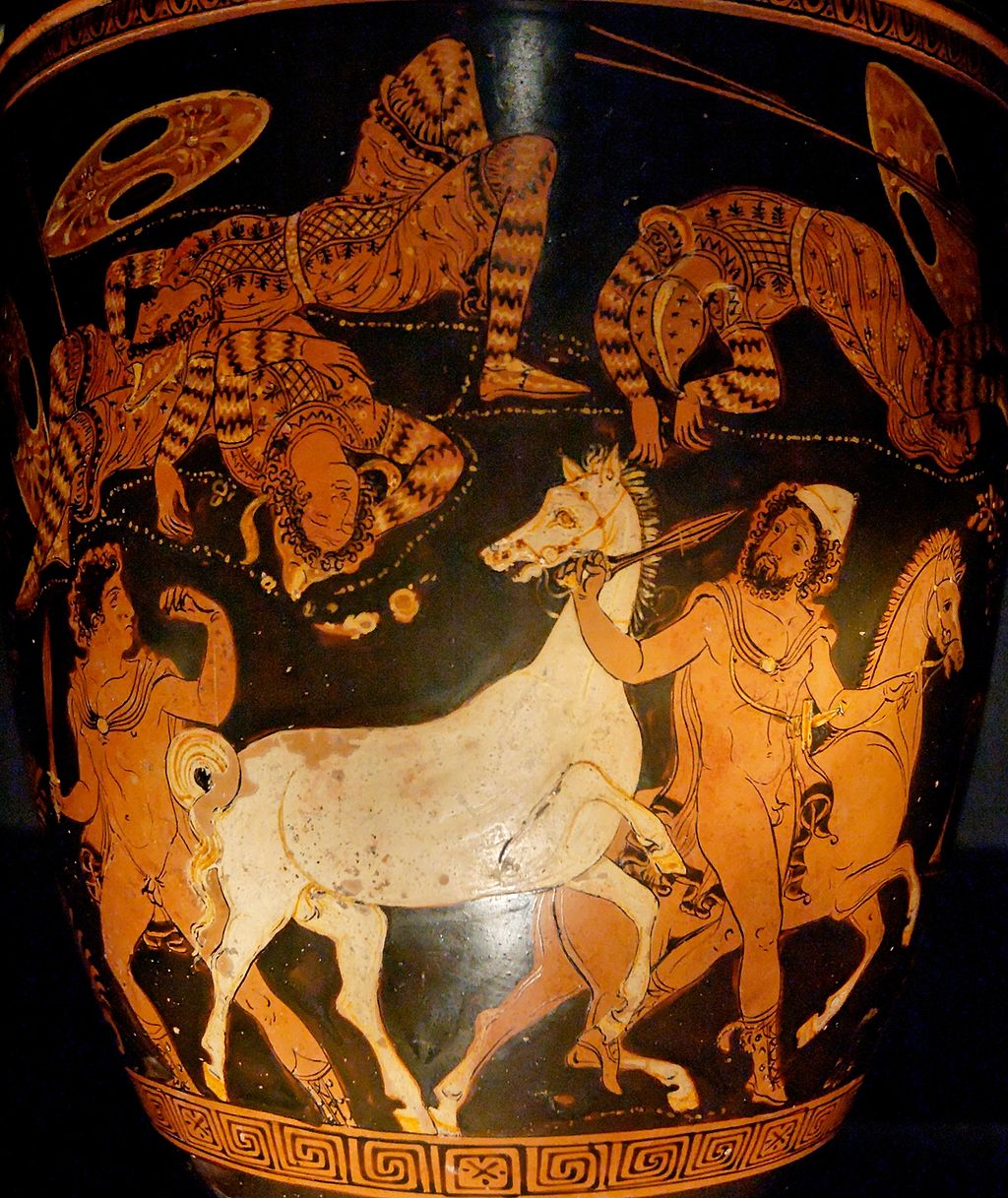 Odysseus and Diomedes stealing the horses of Thracian king Rhesus they have just killed. Apulian red-figure situla, from Ruvo When Hector proposes a single combat duel, Odysseus is one of the Danaans who reluctantly volunteered to battle him. Telamonian Ajax ("The Greater"), however, is the volunteer who eventually fights Hector.[32] Odysseus aids Diomedes during the night operations to kill Rhesus, because it had been foretold that if his horses drank from the Scamander River, Troy could not be taken.[33] After Patroclus is slain, it is Odysseus who counsels Achilles to let the Achaean men eat and rest rather than follow his rage-driven desire to go back on the offensive—and kill Trojans—immediately. Eventually (and reluctantly), he consents.[34] During the funeral games for Patroclus, Odysseus becomes involved in a wrestling match with Ajax "The Greater" and foot race with Ajax "The Lesser", son of Oileus and Nestor's son Antilochus. He draws the wrestling match, and with the help of the goddess Athena, he wins the race.[35] Odysseus has traditionally been viewed as Achilles' antithesis in the Iliad:[36] while Achilles' anger is all-consuming and of a self-destructive nature, Odysseus is frequently viewed as a man of the mean, a voice of reason, renowned for his self-restraint and diplomatic skills. He is also in some respects antithetical to Telamonian Ajax (Shakespeare's "beef-witted" Ajax): while the latter has only brawn to recommend him, Odysseus is not only ingenious (as evidenced by his idea for the Trojan Horse), but an eloquent speaker, a skill perhaps best demonstrated in the embassy to Achilles in book 9 of the Iliad. The two are not only foils in the abstract but often opposed in practice since they have many duels and run-ins. Other stories from the Trojan War  Roman mosaic depicting Odysseus at Skyros unveiling the disguised Achilles;[37] from La Olmeda, Pedrosa de la Vega, Spain, 5th century AD Since a prophecy suggested that the Trojan War would not be won without Achilles, Odysseus and several other Achaean leaders are described in the Achilleid as having gone to Skyros to find him. Odysseus discovered Achilles by offering gifts, adornments and musical instruments as well as weapons, to the king's daughters, and then having his companions imitate the noises of an enemy's attack on the island (most notably, making a blast of a trumpet heard), which prompted Achilles to reveal himself by picking a weapon to fight back, and together they departed for the Trojan War.[38] The story of the death of Palamedes has many versions. According to some, Odysseus never forgives Palamedes for unmasking his feigned madness and plays a part in his downfall. One tradition says Odysseus convinces a Trojan captive to write a letter pretending to be from Palamedes. A sum of gold is mentioned to have been sent as a reward for Palamedes' treachery. Odysseus then kills the prisoner and hides the gold in Palamedes' tent. He ensures that the letter is found and acquired by Agamemnon, and also gives hints directing the Argives to the gold. This is evidence enough for the Greeks, and they have Palamedes stoned to death. Other sources say that Odysseus and Diomedes goad Palamedes into descending a well with the prospect of treasure being at the bottom. When Palamedes reaches the bottom, the two proceed to bury him with stones, killing him.[39]  Oinochoe, ca 520 BC, Odysseus and Ajax fighting over the armour of Achilles When Achilles is slain in battle by Paris, it is Odysseus and Ajax who retrieve the fallen warrior's body and armour in the thick of heavy fighting. During the funeral games for Achilles, Odysseus competes once again with Ajax. Thetis says that the arms of Achilles will go to the bravest of the Greeks, but only these two warriors dare lay claim to that title. The two Argives became embroiled in a heavy dispute about one another's merits to receive the reward. The Greeks dither out of fear in deciding a winner, because they did not want to insult one and have him abandon the war effort. Nestor suggests that they allow the captive Trojans to decide the winner.[40] The accounts of the Odyssey disagree, suggesting that the Greeks themselves hold a secret vote.[41] In any case, Odysseus is the winner. Enraged and humiliated, Ajax is driven mad by Athena. When he returns to his senses, in shame at how he has slaughtered livestock in his madness, Ajax kills himself by the sword that Hector had given him after their duel.[42] Together with Diomedes, Odysseus fetches Achilles' son, Pyrrhus, to come to the aid of the Achaeans, because an oracle had stated that Troy could not be taken without him. A great warrior, Pyrrhus is also called Neoptolemus (Greek for "new warrior"). Upon the success of the mission, Odysseus gives Achilles' armour to him. It is learned that the war can not be won without the poisonous arrows of Heracles, which are owned by the abandoned Philoctetes. Odysseus and Diomedes (or, according to some accounts, Odysseus and Neoptolemus) leave to retrieve them. Upon their arrival, Philoctetes (still suffering from the wound) is seen still to be enraged at the Danaans, especially at Odysseus, for abandoning him. Although his first instinct is to shoot Odysseus, his anger is eventually diffused by Odysseus' persuasive powers and the influence of the gods. Odysseus returns to the Argive camp with Philoctetes and his arrows.[43] Perhaps Odysseus' most famous contribution to the Greek war effort is devising the strategy of the Trojan Horse, which allows the Greek army to sneak into Troy under cover of darkness. It is built by Epeius and filled with Greek warriors, led by Odysseus.[44] Odysseus and Diomedes steal the Palladium that lay within Troy's walls, for the Greeks were told they could not sack the city without it. Some late Roman sources indicate that Odysseus schemed to kill his partner on the way back, but Diomedes thwarts this attempt. 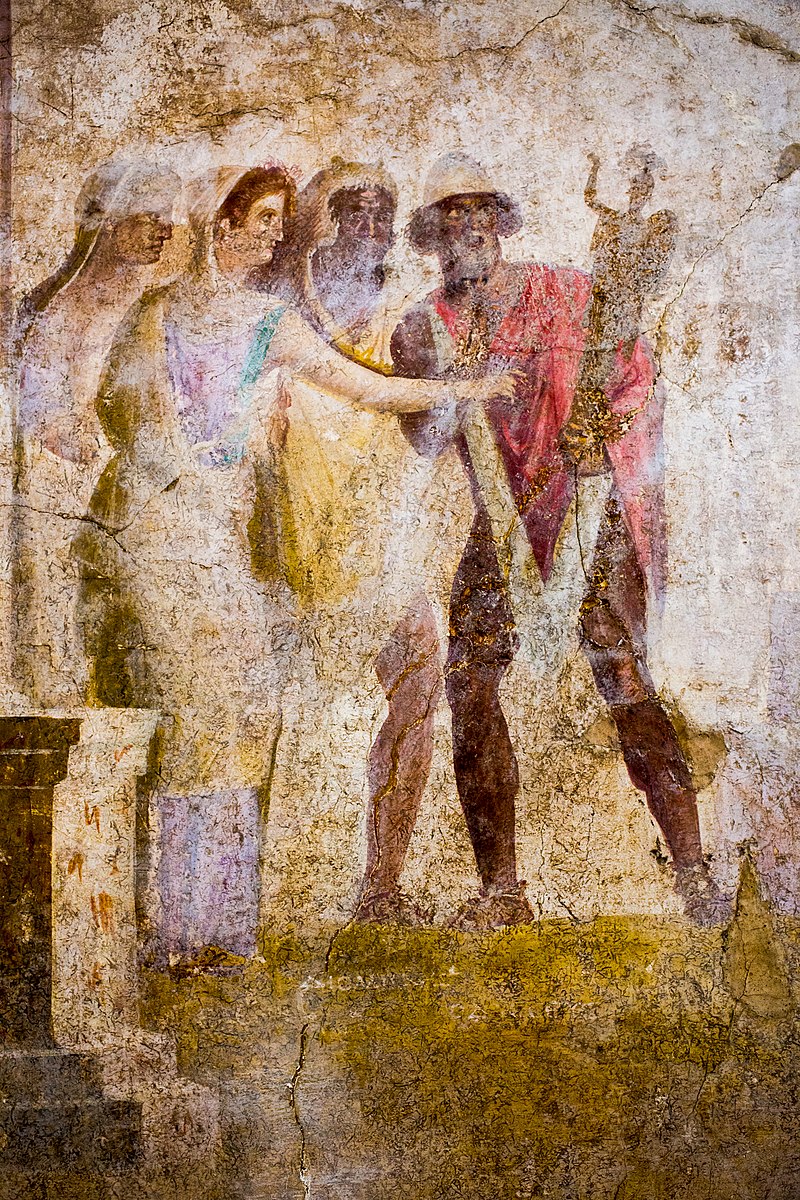 Odysseus (pileus hat) carrying off the palladion from Troy, with the help of Diomedes, against the resistance of Cassandra and other Trojans. Antique fresco from Pompeii. "Cruel, deceitful Ulixes" of the Romans Homer's Iliad and Odyssey portray Odysseus as a culture hero, but the Romans, who believed themselves the heirs of Prince Aeneas of Troy, considered him a villainous falsifier. In Virgil's Aeneid, written between 29 and 19 BC, he is constantly referred to as "cruel Odysseus" (Latin dirus Ulixes) or "deceitful Odysseus" (pellacis, fandi fictor). Turnus, in Aeneid, book 9, reproaches the Trojan Ascanius with images of rugged, forthright Latin virtues, declaring (in John Dryden's translation), "You shall not find the sons of Atreus here, nor need the frauds of sly Ulysses fear." While the Greeks admired his cunning and deceit, these qualities did not recommend themselves to the Romans, who possessed a rigid sense of honour. In Euripides' tragedy Iphigenia at Aulis, having convinced Agamemnon to consent to the sacrifice of his daughter, Iphigenia, to appease the goddess Artemis, Odysseus facilitates the immolation by telling Iphigenia's mother, Clytemnestra, that the girl is to be wed to Achilles. Odysseus' attempts to avoid his sacred oath to defend Menelaus and Helen offended Roman notions of duty, and the many stratagems and tricks that he employed to get his way offended Roman notions of honour. Journey home to Ithaca This section does not cite any sources. Please help improve this section by adding citations to reliable sources. Unsourced material may be challenged and removed. (September 2023) (Learn how and when to remove this message) Further information: Homer's Ithaca and Returns from Troy Odysseus is probably best known as the eponymous hero of the Odyssey. This epic describes his travails, which lasted for 10 years, as he tries to return home after the Trojan War and reassert his place as rightful king of Ithaca.  Odysseus and Polyphemus (1896) by Arnold Böcklin: Odysseus and his crew escape the Cyclops Polyphemus. Homebound from Troy, after a raid on Ismarus in the land of the Cicones, he and his twelve ships are driven off course by storms. They visit the lethargic Lotus-Eaters and are captured by the Cyclops Polyphemus while visiting his island. After Polyphemus eats several of his men, he and Odysseus have a discussion and Odysseus tells Polyphemus his name is Outis ("Nobody"). Odysseus takes a barrel of wine and the Cyclops drinks it, falling asleep. Odysseus and his men take a wooden stake, ignite it with the remaining wine, and blind him. While they escape, Polyphemus cries in pain, and the other Cyclopes ask him what is wrong. Polyphemus cries, "Nobody has blinded me!" and the other Cyclopes think he has gone mad. Odysseus and his crew escape, but Odysseus rashly reveals his real name, and Polyphemus prays to Poseidon, his father, to take revenge. They stay with Aeolus, the master of the winds, who gives Odysseus a leather bag containing all the winds, except the west wind, a gift that should have ensured a safe return home. However, the sailors foolishly open the bag while Odysseus sleeps, thinking that it contains gold. All of the winds fly out, and the resulting storm drives the ships back the way they had come, just as Ithaca comes into sight. After pleading in vain with Aeolus to help them again, they re-embark and encounter the cannibalistic Laestrygonians. Odysseus' ship is the only one to escape. He sails on and visits the witch-goddess Circe. She turns half of his men into swine after feeding them cheese and wine. Hermes warns Odysseus about Circe and gives him a drug called moly, which resists Circe's magic. Circe, being attracted to Odysseus' resistance, falls in love with him and releases his men. Odysseus and his crew remain with her on the island for one year, while they feast and drink. Finally, Odysseus' men convince him to leave for Ithaca. Guided by Circe's instructions, Odysseus and his crew cross the ocean and reach a harbor at the western edge of the world, where Odysseus sacrifices to the dead and summons the spirit of the old prophet Tiresias for advice. Next Odysseus meets the spirit of his own mother, who had died of grief during his long absence. From her, he learns for the first time news of his own household, threatened by the greed of Penelope's suitors. Odysseus also talks to his fallen war comrades and the mortal shade of Heracles. 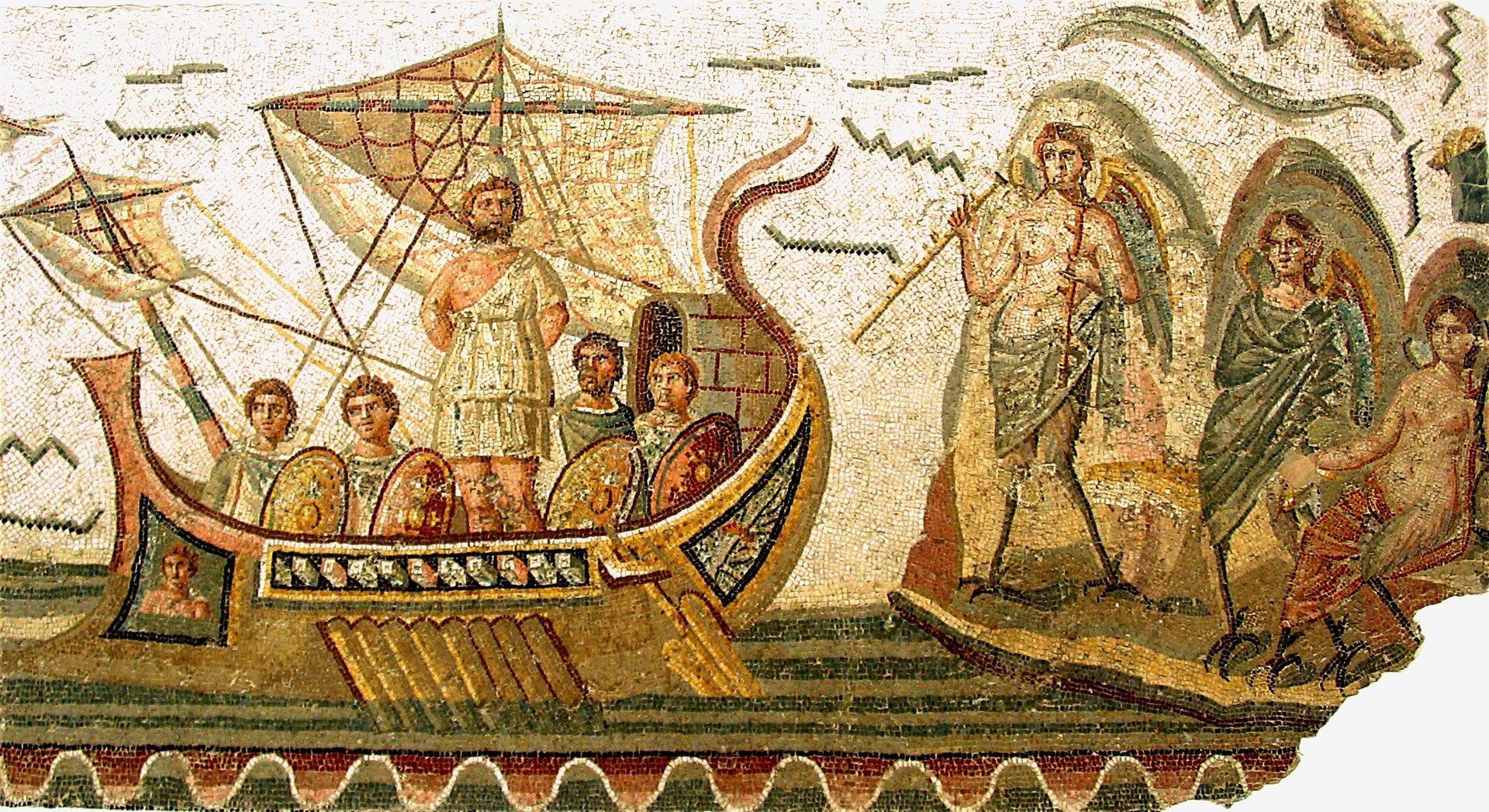 Odysseus and the Sirens, Ulixes mosaic at the Bardo National Museum in Tunis, Tunisia, 2nd century AD Odysseus and his men return to Circe's island, and she advises them on the remaining stages of the journey. They skirt the land of the Sirens, pass between the six-headed monster Scylla and the whirlpool Charybdis, where they row directly between the two. However, Scylla drags the boat towards her by grabbing the oars and eats six men. They land on the island of Thrinacia. There, Odysseus' men ignore the warnings of Tiresias and Circe and hunt down the sacred cattle of the sun god Helios. Helios tells Zeus what happened and demands Odysseus' men be punished or else he will take the sun and shine it in the Underworld. Zeus fulfills Helios' demands by causing a shipwreck during a thunderstorm in which all but Odysseus drown. He washes ashore on the island of Ogygia, where Calypso compels him to remain as her lover for seven years. He finally escapes when Hermes tells Calypso to release Odysseus. Odysseus is shipwrecked and befriended by the Phaeacians. After he tells them his story, the Phaeacians, led by King Alcinous, agree to help Odysseus get home. They deliver him at night, while he is fast asleep, to a hidden harbor on Ithaca. He finds his way to the hut of one of his own former slaves, the swineherd Eumaeus, and also meets up with Telemachus returning from Sparta. Athena disguises Odysseus as a wandering beggar to learn how things stand in his household. 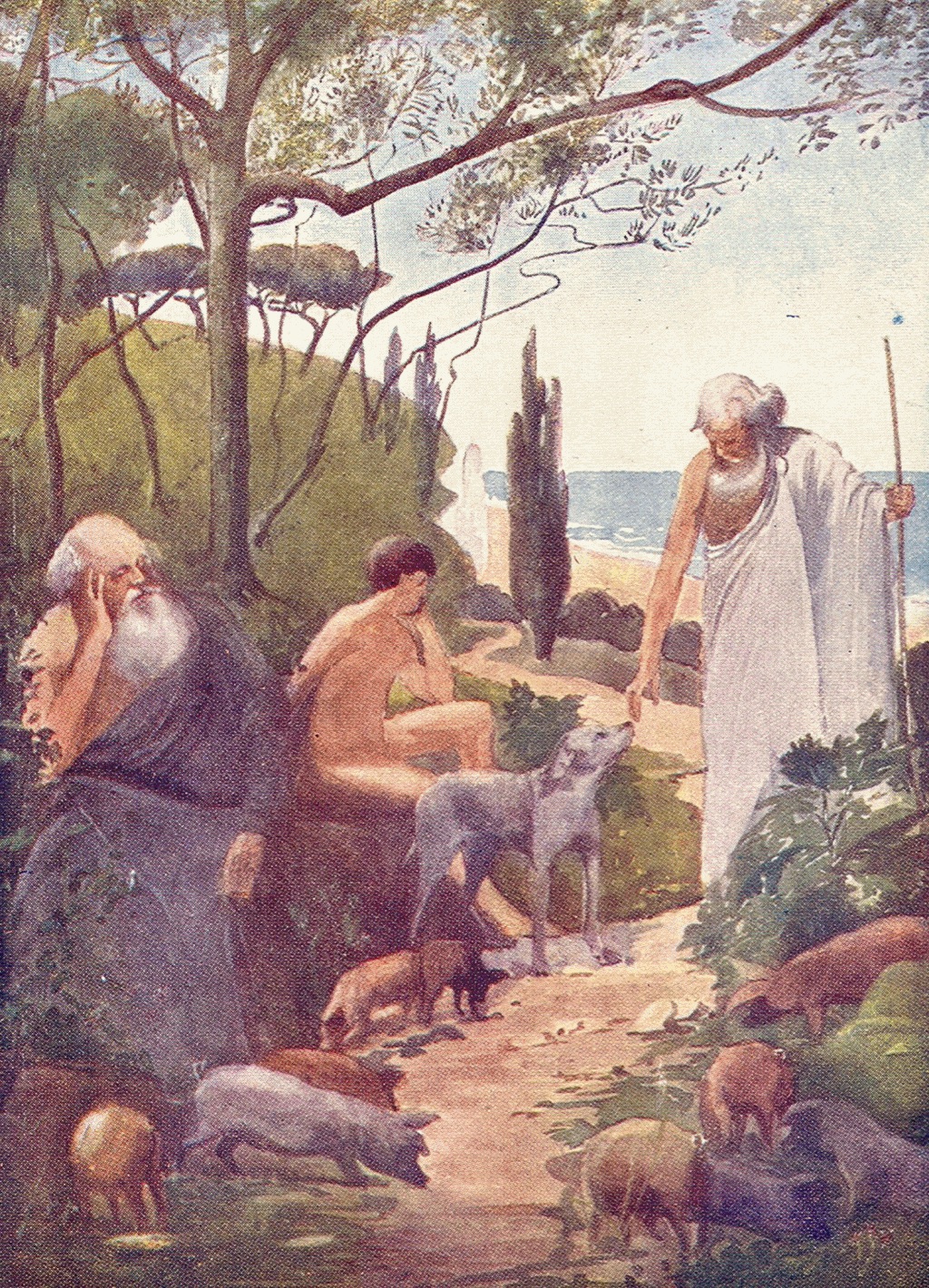 The return of Ulysses, illustration by E. M. Synge from the 1909 Story of the World children's book series (book 1: On the shores of Great Sea) When the disguised Odysseus returns after 20 years, he is recognized only by his faithful dog, Argos. Penelope announces in her long interview with the disguised hero that whoever can string Odysseus' rigid bow and shoot an arrow through twelve axe shafts may have her hand. According to Bernard Knox, "For the plot of the Odyssey, of course, her decision is the turning point, the move that makes possible the long-predicted triumph of the returning hero".[45] Odysseus' identity is discovered by the housekeeper, Eurycleia, as she is washing his feet and discovers an old scar Odysseus received during a boar hunt. Odysseus swears her to secrecy, threatening to kill her if she tells anyone. When the contest of the bow begins, none of the suitors are able to string the bow. After all the suitors have given up, the disguised Odysseus asks to participate. Though the suitors refuse at first, Penelope intervenes and allows the "stranger" (the disguised Odysseus) to participate. Odysseus easily strings his bow and wins the contest. Having done so, he proceeds to slaughter the suitors (beginning with Antinous whom he finds drinking from Odysseus' cup) with help from Telemachus and two of Odysseus' servants, Eumaeus the swineherd and Philoetius the cowherd. Odysseus tells the serving women who slept with the suitors to clean up the mess of corpses and then has those women hanged in terror. He tells Telemachus that he will replenish his stocks by raiding nearby islands. Odysseus has now revealed himself in all his glory (with a little makeover by Athena); yet Penelope cannot believe that her husband has really returned—she fears that it is perhaps some god in disguise, as in the story of Alcmene (mother of Heracles)—and tests him by ordering her servant Euryclea to move the bed in their wedding-chamber. Odysseus protests that this cannot be done since he made the bed himself and knows that one of its legs is a living olive tree. Penelope finally accepts that he truly is her husband, a moment that highlights their homophrosýnē ("like-mindedness"). The next day Odysseus and Telemachus visit the country farm of his old father Laërtes. The citizens of Ithaca follow Odysseus on the road, planning to avenge the killing of the Suitors, their sons. The goddess Athena and the god Zeus intervene and persuade both sides to make peace. Other tales According to some late sources, most of them purely genealogical, Odysseus had many other children besides Telemachus. Most such genealogies aimed to link Odysseus with the foundation of many Italic cities. The most famous being: with Penelope: Poliporthes (born after Odysseus' return from Troy) with Circe: Telegonus, Ardeas, Latinus, also Auson and Cassiphone.[46] Xenagoras writes that Odysseus with Circe had three sons, Romos (Ancient Greek: Ῥώμος), Anteias (Ancient Greek: Ἀντείας) and Ardeias (Ancient Greek: Ἀρδείας), who built three cities and called them after their own names. The city that Romos founded was Rome.[47] with Calypso: Nausithous, Nausinous with Callidice: Polypoetes with Euippe: Euryalus with daughter of Thoas: Leontophonus He figures in the end of the story of King Telephus of Mysia. The last poem in the Epic Cycle is called the Telegony, and is now lost. According to remaining fragments, it told the story of Odysseus' last voyage to the land of the Thesprotians. There he married the queen Callidice. Then he led the Thesprotians in a war with their neighbors the Brygoi (Brygi, Brygians) and defeated in battle the neighboring peoples who attacked him. When Callidice died, Odysseus returned home to Ithaca, leaving their son, Polypoetes, to rule Thesprotia. In the island he met his death at the hands of Telegonus, his son with Circe, after a misunderstanding. Telegonus attacked his father with a poisoned spear, given to him by Circe. Before dying, Odysseus recognized his son. Telegonus then brought back his father's corpse to Aeaea, together with Penelope and Odysseus' son by her, Telemachus. After burying Odysseus, Circe made the other three immortal. Circe married Telemachus, and Telegonus married Penelope [48] by the advice of Athena.[49] According to what seems to be later tradition, Odysseus was resurrected by Circe after his death at the hands of Telegonus. Afterward, he marries Telemachus with Cassiphone, the daughter whom Odysseus had with Circe.[50][51] In 5th century BC Athens, tales of the Trojan War were popular subjects for tragedies. Odysseus figures centrally or indirectly in a number of the extant plays by Aeschylus, Sophocles (Ajax, Philoctetes) and Euripides (Hecuba, Rhesus, Cyclops) and figured in still more that have not survived. In his Ajax, Sophocles portrays Odysseus as a modern voice of reasoning compared to the title character's rigid antiquity. Plato in his dialogue Hippias Minor examines a literary question about whom Homer intended to portray as the better man, Achilles or Odysseus.  Head of Odysseus wearing a pileus depicted on a 3rd-century BC coin from Ithaca Pausanias at the Description of Greece writes that at Pheneus there was a bronze statue of Poseidon, surnamed Hippios (Ancient Greek: Ἵππιος), meaning of horse, which according to the legends was dedicated by Odysseus and also a sanctuary of Artemis which was called Heurippa (Ancient Greek: Εὑρίππα), meaning horse finder, and was founded by Odysseus.[52] According to the legends Odysseus lost his mares and traversed Greece in search of them. He found them on that site in Pheneus.[52] Pausanias adds that according to the people of Pheneus, when Odysseus found his mares he decided to keep horses in the land of Pheneus, just as he reared his cows. The people of Pheneus also pointed out to him writing, purporting to be instructions of Odysseus to those tending his mares.[53] As Ulysses, he is mentioned regularly in Virgil's Aeneid written between 29 and 19 BC, and the poem's hero, Aeneas, rescues one of Ulysses' crew members who was left behind on the island of the Cyclopes. He in turn offers a first-person account of some of the same events Homer relates, in which Ulysses appears directly. Virgil's Ulysses typifies his view of the Greeks: he is cunning but impious, and ultimately malicious and hedonistic. Ovid retells parts of Ulysses' journeys, focusing on his romantic involvements with Circe and Calypso, and recasts him as, in Harold Bloom's phrase, "one of the great wandering womanizers". Ovid also gives a detailed account of the contest between Ulysses and Ajax for the armour of Achilles. Greek legend tells of Ulysses as the founder of Lisbon, Portugal, calling it Ulisipo or Ulisseya, during his twenty-year errand on the Mediterranean and Atlantic seas. Olisipo was Lisbon's name in the Roman Empire. This folk etymology is recounted by Strabo based on Asclepiades of Myrlea's words, by Pomponius Mela, by Gaius Julius Solinus (3rd century AD), and would later be reiterated by Camões in his epic poem Os Lusíadas (first printed in 1572).[citation needed] In one version of Odysseus's end, he is eventually turned into a horse by Athena.[54] |
神話 トロイ戦争以前 オデュッセウスの戦前の功績とされるものの大半は、主に神話作家のプセウド・アポロドロスとヒュギーヌスによるもので、ホメーロスより何世紀も後の時代の ものである。特に有名なのは次の2つの話である。 トロイのヘレンが誘拐されたとき、メネラウスは求婚者たちに誓いを守り、ヘレンを取り戻すのを助けるよう呼びかけた。この試みはトロイ戦争へとつながる。 オデュッセウスは、狂気を装うことでそれを回避しようとした。なぜなら、もしそうすれば、予言者から長らく遅れていた故郷への帰還が予言されていたからで ある。彼はロバと牛を自分の鋤に繋ぎ(それぞれ歩幅が異なるため、鋤の効率が妨げられる)、(一部の現代の資料では、)塩をまいて畑に種を蒔き始めた。パ ライデスはメネラウスの兄アガメムノンの命を受け、オデュッセウスの狂気を否定しようとして、オデュッセウスの幼子テレマコスを鋤の前に立たせた。オ デュッセウスは鋤を息子から遠ざけ、パライデスの策略を暴いた。[28] オデュッセウスはパライデスが戦場で自分を家から引きずり出したことを恨んでいた。 トロイは彼なしでは陥落できないという予言があったため、オデュッセウスとアガメムノンの他の使節団は、アキレスをスカイロス島に徴集しに向かった。ほと んどの説によると、アキレスの母であるテティスは、アキレスが長生きして平穏な人生を送るか、若くして死ぬことで永遠の栄光を達成するかのどちらかになる という神託を受けていたため、徴集者から息子を隠すために、青年を女装させた。オデュッセウスは、ホストの娘たちへの贈り物の装飾品の中に隠された武器を 調べることに興味を示したのは、その中にいたアキレスただ一人であったことから、目の前にいる女性たちの中でアキレスが誰であるかを巧妙に見抜いた。オ デュッセウスはさらに、戦いのラッパを鳴らすよう手配し、それによってアキレスは武器を握りしめ、訓練された素質を示した。変装は失敗に終わり、正体がば れてしまい、アガメムノンのヘレネス(ギリシア人)への出陣の呼びかけに加わった。[29] トロイア戦争中 イリアス 詳細は「イリアス」を参照  パトロクロスを馬車に乗せているメネラウスとメロペス、それを見守るオデュッセウス、イタリア、ヴォルテッラのエトルリア産アラバスター製壷、紀元前2世 紀 オデュッセウスはホメーロスの叙事詩ではトロイア戦争における最も影響力のあるギリシアの英雄の一人として描かれている。ネストールやイドメネウスととも に、最も信頼される参謀の一人である。彼は常にアカイア人の大義を擁護し、特に他の者がアガメムノンの命令に異議を唱える場合、例えばテルシテースが彼に 反対意見を述べたような場合である。アガメムノンがアカイア軍の士気を試すためにトロイ出発の意思を表明すると、オデュッセウスはギリシア軍の陣営に秩序 を取り戻した。[30] その後、多くの英雄たちが負傷により戦場を離れると(オデュッセウスとアガメムノンもその一人)、オデュッセウスは再びアガメムノンに撤退しないよう説得 した。他の2人の使者とともに、彼は失敗に終わった使節団の一員として選ばれ、アキレスを説得して戦場に戻らせようとした。[31]  オデュッセウスとディオメデスが、殺したばかりのトラキア王レサスの馬を奪う。ルーヴォの赤像式シトゥラ ヘクトルが一騎打ちを申し出ると、オデュッセウスは不本意ながら彼と戦うことを志願したダナオスの一人となった。しかし、テラモニアのアイアコス(「大 男」)が最終的にヘクトルと戦う志願者となった。オデュッセウスは、トロイを陥落させるには彼の馬をスキャンデルス川で飲ませてはならないと予言されてい たため、夜間作戦でレサスを殺すためにディオメデスを助けた。 パトロクロスが殺された後、アキレスが怒りに駆られてすぐに反撃に出てトロイ人を殺そうとするのを止め、アカイア人の兵士たちに食事と休息を取らせるよう 助言したのはオデュッセウスであった。最終的に(しぶしぶながら)彼は同意する。[34] パトロクロスを追悼する競技会で、オデュッセウスは「大」アイジャックスとのレスリング試合、「小」アイジャックスとの徒競走に挑む。 彼はレスリングでは勝利し、女神アテナの助けを得て徒競走でも勝利した。[35] オデュッセウスは伝統的に『イーリアス』におけるアキレスの対立概念と見なされてきた。[36] アキレスの怒りはすべてを焼き尽くすような自己破壊的な性質のものであるのに対し、オデュッセウスは度量の大きい人物、理性の声として描かれることが多 く、自制心と外交手腕に長けていることで知られている。また、テラモニアのアイアコス(シェイクスピアの「愚鈍な」アイアコス)とは対照的な面もある。後 者は肉体的な強さだけが取り柄であるが、オデュッセウスはトロイの木馬のアイデアに示されるように、機知に富むだけでなく、雄弁家でもあり、その能力は 『イーリアス』第9巻のアキレスへの使節団で最もよく発揮されている。この2人は抽象的な対比にとどまらず、実際にも多くの決闘や衝突を繰り返しているた め、しばしば対立する。 トロイ戦争のその他の物語  変装したアキレスを暴くオデュッセウスを描いたローマ時代のモザイク画。[37] スペイン、ラ・オルメダ、ペドロサ・デ・ラ・ベガ、5世紀 アキレスなしにはトロイ戦争に勝利できないという予言があったため、オデュッセウスと他のアカイア人の指導者数名は、アキレイドの中でアキレスを見つける ためにスキュロス島に向かったと描写されている。オデュッセウスは、王の娘たちに贈り物や装飾品、楽器、武器を贈り、さらに仲間たちに島の敵の攻撃の音を 真似させた(特にラッパを吹き鳴らす音を聞かせた)。これに反応してアキレスが武器を手に反撃の姿勢を見せ、二人は共にトロイ戦争へと旅立った。 パライメデスの死に関する物語には多くのバージョンがある。 一説によると、オデュッセウスはパライメデスが狂気を装っていたことを暴露し、彼の失脚の一因となったことを決して許さなかった。 ある伝承によると、オデュッセウスはトロイの捕虜にパライメデスからの手紙を装った手紙を書かせた。 パライメデスの裏切りに対する報酬として多額の金が送られたとされている。オデュッセウスはその後、捕虜を殺害し、黄金をパレメデスのテントに隠した。そ して、アガメムノンがその手紙を見つけ、入手するようにしむけ、アルゴス人たちに黄金のありかを示唆した。これはギリシア人たちにとって十分な証拠であ り、彼らはパレメデスを石打ちの刑に処した。他の資料によると、オデュッセウスとディオメデスは、黄金が底にあると見せかけてパレメデスを井戸に降りるよ うに仕向けた。パライメデスが底に到達すると、二人は彼を石で埋めて殺した。[39]  オイノコエ、紀元前520年頃、アキレスの鎧を巡って争うオデュッセウスとアジャックス アキレスがパリスとの戦いで命を落とすと、激しい戦闘のさなか、倒れた戦士の遺体と鎧を回収したのはオデュッセウスとアジャックスであった。アキレスの葬 送競技の間、オデュッセウスは再びアジャックスと競い合う。テティスは、アキレスの武具はギリシア人の中で最も勇敢な者のものになるだろうと語るが、その 称号を主張する勇気のある者はこの2人の戦士だけだった。2人のアルゴス人は、褒美を受けるにふさわしいのはどちらかについて激しい論争を繰り広げた。ギ リシア人は、どちらかを勝者と決定することで、その者を侮辱し戦意を失わせることを望まなかったため、優柔不断になった。ネストールは、捕虜のトロイ人に 勝者を決定させることを提案した。[40] オデュッセイアの記述は一致しておらず、ギリシア人自身が秘密投票を行ったことを示唆している。[41] いずれにしても、オデュッセウスが勝者となった。激怒し、屈辱を受けたアジャックスはアテナによって狂気に駆り立てられる。正気を取り戻したとき、狂気の 中で家畜を虐殺したことを恥じたアジャックスは、ヘクトルとの決闘後にヘクトルから与えられた剣で自害した。 トロイアは彼なしでは陥落できないと予言されていたため、オデュッセウスはディオメデスとともに、アキレスの息子ピュロスを連れてきてアカイア人の救援を 求める。 偉大な戦士であるピュロスは、ネオプトロモス(「新しい戦士」の意)とも呼ばれる。 その任務の成功を受けて、オデュッセウスはアキレスの鎧をピュロスに与える。 ヘラクレスの毒矢がなければ戦争に勝てないことが分かり、その矢は見捨てられたフィロクテテスが所有している。オデュッセウスとディオメデス(または、一 部の説によるとオデュッセウスとネオプトロモス)は、その矢を取り戻すために出発する。到着すると、フィロクテテス(まだ傷に苦しんでいる)は、自分を捨 てたダナエ人たち、特にオデュッセウスに対して依然として怒っているのが見られた。彼の本能はまずオデュッセウスを射ようとするが、最終的にはオデュッセ ウスの説得力と神々の影響力によって怒りは鎮まる。オデュッセウスはフィロクテテースとともに矢を取り戻し、アルゴスの陣営に戻る。[43] おそらくオデュッセウスがギリシアの戦争努力に最も貢献したことは、ギリシア軍が夜陰に乗じてトロイに潜入することを可能にしたトロイの木馬の戦略を考案 したことである。エペイオスが作り、オデュッセウスが率いるギリシアの戦士たちで満たされた。ギリシア軍はトロイの木馬に隠れてトロイに侵入した。オ デュッセウスとディオメデスはトロイの城壁内にあったパラディオンを盗んだ。ギリシア軍は、それなしでは都市を略奪できないと伝えられていたからだ。一部 のローマ後期の資料では、オデュッセウスが帰路の途中でパートナーを殺すことを企てたが、ディオメデスがそれを阻止したとされている。  カサンドラや他のトロイ人たちの抵抗を押し切り、ディオメデスの助けを借りてトロイからパラディオンを持ち去るオデュッセウス(パイルス帽)。ポンペイの 古代フレスコ画。 ホメロスの『イーリアス』と『オデュッセイア』における「残酷で欺瞞的なウリクセス」 ホメロスの『イーリアス』と『オデュッセイア』では、オデュッセウスは文化の英雄として描かれているが、トロイの王子アエネアスの後継者であると信じてい たローマ人たちは、彼を悪辣な偽善者とみなした。紀元前29年から19年の間に書かれたヴェルギリウスの『アエネイス』では、彼は常に「残酷なオデュッセ ウス」(ラテン語でdirus Ulixes)または「欺瞞的なオデュッセウス」(ラテン語でpellacis、fandi fictor)と呼ばれている。『エネーイス』第9巻では、トロイ人のアスカニウスを粗野で率直なラテンの美徳の象徴として非難し、「アトレウスの息子は ここにはいない。ずる賢いオデュッセウスの詐欺を恐れる必要もない」と宣言している(ジョン・ドライデンの訳)。ギリシア人は彼の狡猾さと欺瞞を賞賛した が、こうした性質は厳格な名誉観を持つローマ人には受け入れられなかった。エウリピデスの悲劇『アウリスに於けるイフィゲニア』では、女神アルテミスを鎮 めるために娘イフィゲニアを生贄として捧げることをアガメムノンに承諾させたオデュッセウスは、イフィゲニアの母クリュタイムネストラに、イフィゲニアは アキレスと結婚することになると告げ、生贄を容易にしている。メネラウスとヘレンを守るという神聖な誓いを回避しようとしたオデュッセウスの試みはローマ 人の義務観念を傷つけ、自分のやり方を貫くために用いた数々の策略や計略はローマ人の名誉観を傷つけた。 イタカ島への帰路 この節には出典が全く示されていないか、不十分です。出典を追加して記事の信頼性向上にご協力ください。出典の無い項目は、異議申し立てを受けて削除され ることがあります。 (2023年9月) (Learn how and when to remove this message) 詳細は「ホメーロスのイタカとトロイアからの帰還」を参照 オデュッセウスは、おそらく『オデュッセイア』の主人公として最もよく知られている。この叙事詩は、トロイア戦争の後、故郷イタカ島への帰還と正当な王と しての地位の回復を試みるオデュッセウスの10年にわたる苦難を描いている。  オデュッセウスとポリュペーモス(1896年) アルノルト・ベックリン作:オデュッセウスと乗組員は、キュクロプスのポリュペーモスから逃れる。 トロイから故郷へ戻る途中、シコネス地方のイスマルスを襲撃した後、オデュッセウスと12隻の船団は嵐に遭い、航路を外れる。彼らは無気力なロータスイー ターズを訪れ、ポリュペーモスの島を訪れた際に、ポリュペーモスに捕らえられる。ポリュペーモスが部下数名を食べた後、ポリュペーモスとオデュッセウスは 話し合い、オデュッセウスはポリュペーモスに自分の名前が「アウトス(Nobody)」であると告げた。オデュッセウスは樽に入ったワインを取り出し、そ れを飲んだポリュペーモスは眠りについた。オデュッセウスと部下たちは木の杭に火をつけ、残りのワインを注ぎ、ポリュペーモスを盲目にした。彼らが逃げ去 る間、ポリュペーモスは痛みに叫び、他のキュクロプスたちが彼に何が起こったのか尋ねた。ポリュペーモスは「誰も私を盲目にしない!」と叫び、他のキュク ロプスたちは彼が狂ってしまったと思った。オデュッセウスと仲間たちは逃げ延びたが、オデュッセウスは軽率にも自分の本当の名前を明かし、ポリュペーモス は父であるポセイドンに復讐を誓った。彼らは風の神アイオロスの元に滞在し、アイオロスはオデュッセウスに、西風以外のすべての風を入れる革袋を授けた。 この贈り物は、無事に帰郷できるはずのものであった。しかし、船員たちは愚かにも、オデュッセウスが眠っている間に袋を開けてしまい、中身が金だと思った のだ。すべての風が吹き飛び、嵐によって船は来た道を引き返すことになり、ちょうどイサカ島が見えてきた。 再びエオラスに助けを求めたが無駄に終わり、彼らは再び船に乗り込み、人食い人種のラエストラゴン族と遭遇する。オデュッセウスの船だけが難を逃れた。彼 は航海を続け、魔女の女神であるキルケーを訪れる。彼女はオデュッセウスの部下たちにチーズとワインを食べさせた後、その半分の者を豚に変えてしまった。 ヘルメスはオデュッセウスにキルケーについて警告し、キルケーの魔法に抵抗するモリと呼ばれる薬を渡した。セイレーはオデュッセウスの抵抗に惹かれ、彼に 恋をし、彼の部下たちを解放した。オデュッセウスと乗組員たちは、彼女の島で1年間、宴会と飲酒を楽しみながら暮らした。ついに、オデュッセウスの部下た ちは彼を説得し、イサカに向けて出発した。 キルケの指示に従って、オデュッセウスと乗組員たちは海を渡り、世界の西端にある港に到着した。そこでオデュッセウスは死者を祀り、助言を求めるために年 老いた予言者ティレシアスの霊を呼び出した。次にオデュッセウスは、彼の長い不在の間に悲嘆のあまり亡くなった実の母親の霊と出会った。彼女から、ペネロ ペの求婚者たちの強欲によって脅かされている自分の家庭のニュースを初めて知る。オデュッセウスはまた、戦死した戦友たちや、ヘラクレスの亡霊とも話す。  オデュッセウスとセイレーン、チュニスのバルドー国立博物館にあるウリクセスのモザイク画、2世紀 オデュッセウスと部下たちはキルケーの島に戻り、彼女は彼らに旅の残りの行程について助言する。彼らはセイレーンの土地を避け、6つの頭を持つ怪物スキュ ラと渦潮カリュブディスとの間を通り抜ける。しかし、スキュラはオールを掴んで船を自分のほうに引き寄せ、6人の男を食べてしまう。 彼らはスリンアキ島に上陸する。そこでオデュッセウスの部下たちは、ティレシアスとキルケの警告を無視し、太陽神ヘリオスの神聖な牛を追い詰める。ヘリオ スはゼウスにこの出来事を伝え、オデュッセウスの部下たちを処罰しなければ、太陽を冥界に照らし出すと要求する。ゼウスは雷雨の最中に船を難破させ、オ デュッセウス以外の全員を溺れさせることで、ヘリオスの要求を満たした。彼はオギギア島に漂着し、カリプソに7年間彼女の恋人として留まるよう強制され る。 ヘルメスがカリプソにオデュッセウスを解放するよう伝えると、彼はようやく脱出することができた。 オデュッセウスは難破し、フェアクス人に助けられた。 彼らに自分の身の上話をすると、アルキノオス王率いるフェアクス人はオデュッセウスを故郷に帰すことを承諾した。彼らはオデュッセウスが熟睡している夜中 に、イサカの隠れた港まで彼を送り届けた。オデュッセウスはかつての奴隷で豚飼いのエウメウスの小屋を見つけ、また、スパルタから戻ってきたテレマコスと も再会した。アテナは、オデュッセウスの家庭の状況を知るために、彼を放浪の乞食に変装させた。  ユリシーズの帰還、E. M. シンジによるイラスト、1909年刊行の児童書シリーズ『世界の物語』(第1巻:大海の岸辺にて)より 変装したオデュッセウスが20年ぶりに帰還したとき、彼を認めたのは忠犬アルゴだけだった。ペネロペは変装した英雄との長い問答の中で、オデュッセウスの 硬い弓を張り、12本の斧の柄に矢を射ることができる者は、彼女と結婚できると宣言した。バーナード・ノックスによると、「オデュッセイアのプロットにお いて、もちろん、彼女の決断は転換点であり、帰還した英雄の勝利を長い間待ち望んできた人々にとって、その勝利を現実のものとする決断である」[45]。 オデュッセウスの正体は、家政婦のエウリクリエが、彼の足を洗っているときに、イノシシ狩りの際にオデュッセウスが負った古い傷を発見したことで明らかに なった。オデュッセウスは彼女に秘密を守るよう誓わせ、もし誰かに話せば殺すと脅した。 弓のコンテストが始まると、求婚者たちは誰も弓に弦を張ることができない。求婚者たちがみな諦めた後、変装したオデュッセウスが参加を申し出る。求婚者た ちは最初は拒否するが、ペネロペが仲裁に入り、「よそ者」(変装したオデュッセウス)の参加を認める。オデュッセウスは簡単に弓に弦を張り、コンテストに 勝利する。そうして、彼は求婚者たち(オデュッセウスの杯から飲んでいるのを発見したアンティノウスから始まる)を、テレマコスとオデュッセウスの召使で ある豚飼いのエウメイアスと牛飼いのフィロエティウスの2人の助けを借りて殺害していく。オデュッセウスは、求婚者たちと寝た召使の女性たちに死体の始末 を命じ、恐怖に震える彼女たちを絞首刑にする。彼はテレマコスに、近くの島々を襲撃して食料を補充すると告げた。オデュッセウスは今、その栄光の姿を現し た(アテナによるちょっとした変身を施して)。しかし、ペネロペは夫が本当に戻ってきたとは信じられず、アルクメネ(ヘラクレスの母)の物語のように、夫 が変装した神ではないかと疑い、召使のエウリクレイアに命じて新婚時代の寝室のベッドを移動させた。オデュッセウスは、ベッドは自分で作り、その脚の一本 が生きたオリーブの木であることを知っているので、それはできないと抗議する。ついにペネロペは、彼が本当に夫であることを受け入れる。この瞬間、彼らの 「ホモフロシーネ(同質感)」が強調される。 翌日、オデュッセウスとテレマコスは年老いた父ラエルテースの農場を訪れた。イサカの市民たちは求婚者たちを殺したオデュッセウスに復讐しようと、オ デュッセウスを追って道を進んだ。女神アテナと神ゼウスが仲裁に入り、両者に和解を説得した。 その他の物語 後世の資料の多くは純粋に系図的なものだが、それらによると、オデュッセウスにはテレマコス以外にも多くの子供がいた。 このような系図のほとんどは、オデュッセウスと多くのイタリック都市の創設を結びつけることを目的としている。 最も有名なのは、 ペネロペとの間に生まれたポリポルテース(オデュッセウスのトロイア帰還後に誕生) キルケとの間に生まれた テレゴノス、アルデアス、ラティヌス、そしてアウソンとカシフォンである。[46] クセノパラスは、オデュッセウスとセイレーンとの間に3人の息子、ロモス(古代ギリシア語:Ῥώμος)、アンテイアス(古代ギリシア語: Ἀντείας)、アルデアス(古代ギリシア語:Ἀρδείας)がおり、彼らは3つの都市を建設し、自分の名前にちなんで名付けたと書いている。ロモス が築いた都市はローマである。[47] カリプソとの子:ナウシトス、ナウシノス カリディケとの子:ポリュペーテース エウイッペーとの子:エウリュアルス テーオースの娘との子:レオンティフォン 彼はミシアの王テレフォスの物語の最後に登場する。 エピック・サイクルの最後の詩は「テレゴニー」と呼ばれ、現在は失われている。残された断片によると、それはオデュッセウスのテスプロティア人たちの土地 への最後の航海の物語であった。そこで彼は女王カリディケと結婚した。その後、彼はテスプロティア人たちを率いて隣人ブリゴイ(ブリギ、ブリギアン)との 戦争に臨み、彼を攻撃した隣人たちを戦いで打ち負かした。カリディケが亡くなると、オデュッセウスは息子ポリュペーテースをテスプロティアの統治者に残 し、イサカに帰郷した。 島で、彼は誤解から、セイレーンとの間に生まれた息子テレゴノスに命を奪われた。 テレゴノスは、セイレーンから受け取った毒の槍で父親を襲った。 死の間際、オデュッセウスは息子であることを認めた。テレゴヌスは父の遺体をペネロペと彼女との間に生まれたオデュッセウスの息子テレマコスのもとへ連れ 戻した。オデュッセウスを埋葬した後、キルケは残りの3人を不死にした。キルケはテレマコスと結婚し、テレゴヌスはアテナの助言によりペネロペと結婚し た。 後世の伝承と思われるものによると、テレゴヌスに殺された後、オデュッセウスはキルケによって復活させられた。その後、オデュッセウスはキルケとの間に設 けた娘カッシフォンとテレゴヌスを結婚させた。 紀元前5世紀のアテナイでは、トロイア戦争の物語は悲劇の人気主題であった。エウリピデス(『ヘクバ』、『羅刹』、『キュクロプス』)、ソフォクレス (『アジャックス』、『フィロクテテス』)、アイスキュロス(『オイディプス王』、『エウリュステウス』、『女の一生』)による現存する戯曲の多くに、オ デュッセウスは直接または間接的に登場しており、現存しない作品にもさらに多く登場している。ソフォクレスは『オイディプス』において、主人公の硬直した 古代性と比較して、オデュッセウスを現代的な理性の声として描いている。 プラトンは対話篇『小ヒッピアス』の中で、ホメロスがアキレスとオデュッセウスのどちらをより優れた人物として描こうとしたのかという文学的な問題を考察 している。  イサカで紀元前3世紀に鋳造されたコインに描かれたパレウスをかぶったオデュッセウスの頭部 パウサニアスの『ギリシア誌』には、フェネウスにはポセイドン(古代ギリシア語:Ἵππιος)の銅像があったと記されている。ポセイドンの名字である ヒッピオスは「馬」を意味し、伝説によると、オデュッセウスが奉納したもので、また アルテミスを祀る聖域は、ギリシャ語で「馬を見つける」を意味する「エウリッパ(古代ギリシャ語:Εὑρίππα)」と呼ばれ、オデュッセウスによって創 設された。[52] 伝説によると、オデュッセウスは自分の雌馬たちを見失い、それらを探してギリシャ中を旅した。彼はフェネウスでその馬を見つけた。[52] パウサニアスは、フェネウスの人々によると、オデュッセウスが自分の馬を見つけたとき、牛を飼育していたように、フェネウスの土地で馬を飼育することを決 めたと付け加えている。フェネウスの人々はまた、オデュッセウスが自分の馬の世話をしていた人々への指示であると主張する文章を彼に示した。[53] ウリッセウスとして、彼は紀元前29年から19年の間に書かれたヴェルギリウスの『アエネイス』に定期的に言及されており、この詩の主人公であるアイネイ アスは、キュクロプスの島に取り残されたウリッセウスの乗組員の一人を救っている。 彼は、ホメーロスが語るのと同じ出来事の一部について、ウリッセウスが直接登場する一人称の説明を提供している。ウェルギリウスの描くオデュッセウスは、 ギリシア人に対する彼の考え方を象徴している。すなわち、彼は狡猾だが不信心で、究極的には悪意に満ちた快楽主義者である。 オウィディウスは、オデュッセウスの旅の一部を再話し、特に彼とキルケーやカリュプソーとの恋愛関係に焦点を当て、ハロルド・ブルームの表現を借りれば 「放浪の女たらし」として描き直している。また、オウィディウスは、オデュッセウスとアイアゲースがアキレスの鎧を巡って争う様子を詳細に描いている。 ギリシャ神話では、地中海と大西洋での20年にわたる航海中、ポルトガルのリスボンを「Ulysippo」または「Ulyssesya」と名付けたのはオ デュッセウスであるとされている。オリシポはローマ帝国におけるリスボンの名称であった。この民間語源は、ストラボンがミルレのアスクレピオスの言葉に基 づいて、ポンポニウス・メラ、ガイウス・ユリウス・ソリヌス(3世紀)によって語られ、後にカモンイスが叙事詩『ルジアダス』(1572年初版)で再び 語ったものである。 オデュッセウスの最期の1つのバージョンでは、最終的にアテナによって馬に変えられてしまうというものもある。[54] |
Odysseus is one of the most recurrent characters in Western culture. Middle Ages and Renaissance Dante Alighieri, in the Canto XXVI of the Inferno segment of his Divine Comedy (1308–1320), encounters Odysseus ("Ulisse" in Italian) near the very bottom of Hell: with Diomedes, he walks wrapped in flame in the eighth ring (Counselors of Fraud) of the Eighth Circle (Sins of Malice), as punishment for his schemes and conspiracies that won the Trojan War. In a famous passage, Dante has Odysseus relate a different version of his voyage and death from the one told by Homer. He tells how he set out with his men from Circe's island for a journey of exploration to sail beyond the Pillars of Hercules and into the Western sea to find what adventures awaited them. Men, says Ulisse, are not made to live like brutes, but to follow virtue and knowledge.[55] After travelling west and south for five months, they see in the distance a great mountain rising from the sea (this is Purgatory, in Dante's cosmology) before a storm sinks them. Dante did not have access to the original Greek texts of the Homeric epics, so his knowledge of their subject-matter was based only on information from later sources, chiefly Virgil's Aeneid but also Ovid; hence the discrepancy between Dante and Homer.[56] He appears in Shakespeare's Troilus and Cressida (1602), set during the Trojan War. Modern literature Poetry In her poem Site of the Castle of Ulysses. (published in 1836), Letitia Elizabeth Landon gives her version of The Song of the Sirens with an explanation of its purpose, structure and meaning. This illustrates a painting by Charles Bentley engraved by R. Sands, and showing The Black Mountains of Cephalonia in the background.[57] A further poetical illustration, also in Fisher's Drawing Room Scrap Book, 1837, is to an engraving of a painting by Charles Bentley, Town and Harbour of Ithaca. and harks back to the island 'where Ulysses was king'.[58] Alfred, Lord Tennyson's poem "Ulysses" (published in 1842) presents an aging king who has seen too much of the world to be happy sitting on a throne idling his days away. Leaving the task of civilizing his people to his son, he gathers together a band of old comrades "to sail beyond the sunset". Nikos Kazantzakis's The Odyssey: A Modern Sequel (1938), a 33,333-line epic poem, begins with Odysseus cleansing his body of the blood of Penelope's suitors. Odysseus soon leaves Ithaca in search of new adventures. Before his death he abducts Helen, incites revolutions in Crete and Egypt, communes with God, and meets representatives of such famous historical and literary figures as Vladimir Lenin, Don Quixote and Jesus. In 1986, Irish poet Eilean Ni Chuilleanain published "The Second Voyage", a poem in which she makes use of the story of Odysseus. Novels 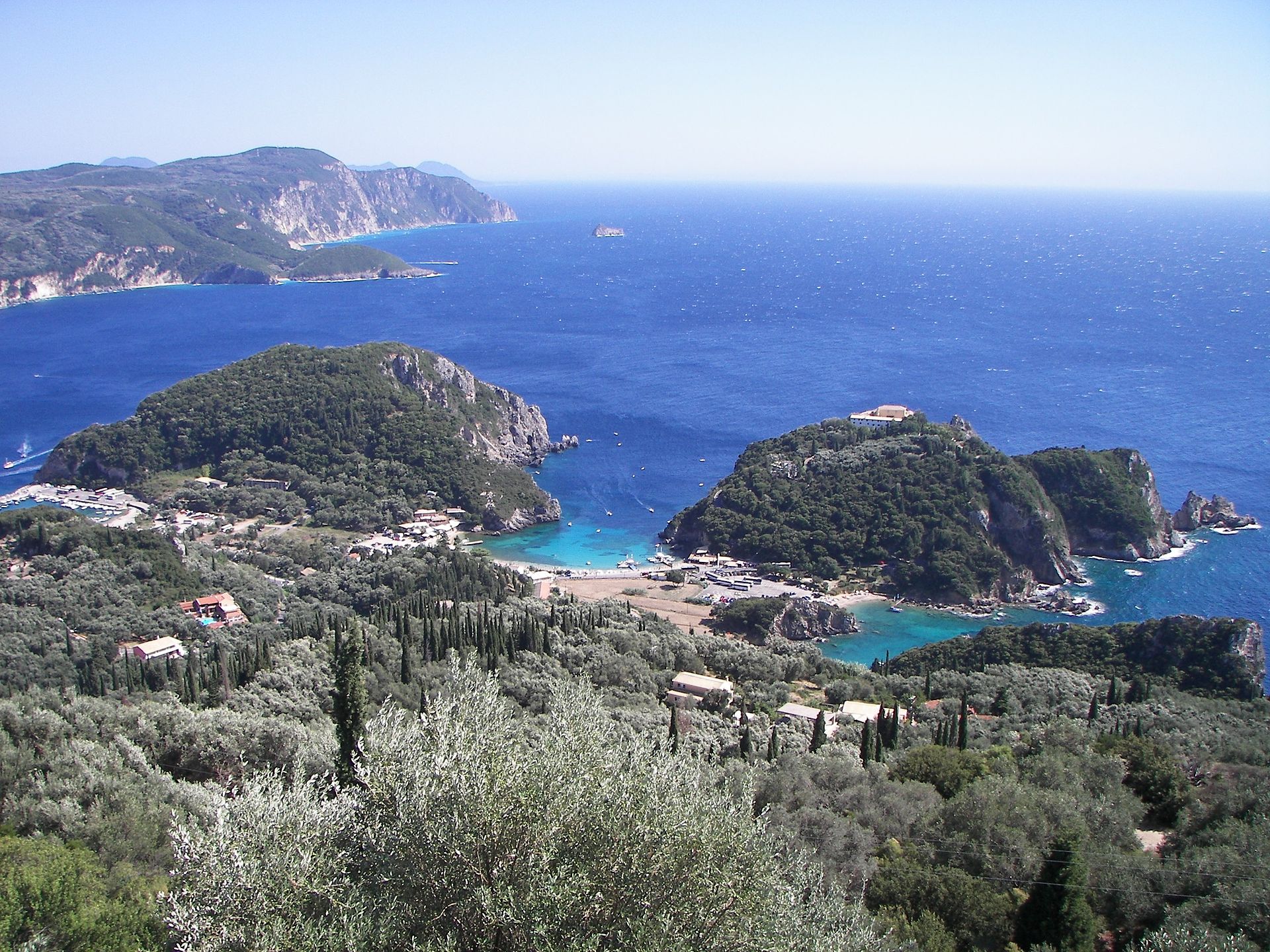 The bay of Palaiokastritsa in Corfu as seen from Bella vista of Lakones, considered to be the place where Odysseus disembarked and met Nausicaa for the first time. The rock in the sea near the horizon at the top centre-left is held by the locals to be the mythical petrified ship of Odysseus. Frederick Rolfe's The Weird of the Wanderer (1912) has the hero Nicholas Crabbe (based on the author) travelling back in time, discovering that he is the reincarnation of Odysseus, marrying Helen, being deified and ending up as one of the three Magi. James Joyce's novel Ulysses (first published 1918–1920) uses modern literary devices to narrate a single day in the life of a Dublin businessman named Leopold Bloom. Bloom's day turns out to bear many elaborate parallels to Odysseus' ten years of wandering. Return to Ithaca (1946) by Eyvind Johnson is a more realistic retelling of the events that adds a deeper psychological study of the characters of Odysseus, Penelope, and Telemachus. Thematically, it uses Odysseus' backstory and struggle as a metaphor for dealing with the aftermath of war (the novel being written immediately after the end of the Second World War).[59] In the eleventh chapter of Primo Levi's 1947 memoir If This Is a Man, "The Canto of Ulysses", the author describes the last voyage of Ulysses as told by Dante in The Inferno to a fellow-prisoner during forced labour in the Nazi concentration camp Auschwitz. Odysseus is the hero of The Luck of Troy (1961) by Roger Lancelyn Green, whose title refers to the theft of the Palladium. In S. M. Stirling's Island in the Sea of Time (1998), first part to his Nantucket series of alternate history novels, Odikweos ("Odysseus" in Mycenaean Greek) is a "historical" figure who is every bit as cunning as his legendary self and is one of the few Bronze Age inhabitants who discerns the time-travellers' real background. Odikweos first aids William Walker's rise to power in Achaea and later helps bring Walker down after seeing his homeland turn into a police state. The Penelopiad (2005) by Margaret Atwood retells his story from the point of view of his wife Penelope. Rick Riordan's novel series Percy Jackson & the Olympians, which centres on the presence of Greek mythology in the 21st century, incorporates several elements from Odysseus's story. The second novel in particular, The Sea of Monsters (2006), is a loose adaptation of The Odyssey, with protagonists Percy and Annabeth seeking to save their satyr friend Grover from Polyphemus, and facing many of the same obstacles Odysseus faced over the course of the journey. Volodymyr Yermolenko, Ukrainian philosopher and essayist, wrote Ocean Catcher: The Story of Odysseus, Stary Lev, 2017, which is loose adaptation of The Odyssey, where after coming back home to Ithaca, where he cannot find either Penelope or Telemachus, he decides to have a reverse trip to Troy.[60][61] Literary criticism The literary theorist Núria Perpinyà conceived twenty different interpretations of the Odyssey in a 2008 study.[62] Television and film The actors who have portrayed Odysseus in feature films include Kirk Douglas in the Italian Ulysses (1955), John Drew Barrymore in The Trojan Horse (1961), Piero Lulli in The Fury of Achilles (1962), and Sean Bean in Troy (2004). In TV miniseries he has been played by Bekim Fehmiu in L'Odissea (1968), Armand Assante in The Odyssey (1997), and by Joseph Mawle in Troy: Fall of a City (2018). Ulysses 31 is a French-Japanese animated television series (1981) that updates the Greek mythology of Odysseus to the 31st century.[63] Music The British group Cream recorded the song "Tales of Brave Ulysses" in 1967. Suzanne Vega's song "Calypso" from 1987 album Solitude Standing shows Odysseus from Calypso's point of view, and tells the tale of him coming to the island and his leaving. The American progressive metal band Symphony X released a 24-minute adaption of the tale on their 2002 album The Odyssey. Odysseus is featured in a verse of the song "Journey of the Magi" on Frank Turner's 2009 album Poetry of the Deed.[64] Rolf Riehm composed an opera based on the myth, Sirenen – Bilder des Begehrens und des Vernichtens (Sirens – Images of Desire and Destruction) which premiered at the Oper Frankfurt in 2014. Playwright Jorge Rivera-Herrans's ongoing musical EPIC: The Musical is a loose adaptation of Homer's Odyssey, adapted for musical theatre. It is split into nine sagas; as of July 4, 2024 the first six sagas – the Troy Saga, the Cyclops Saga, the Ocean Saga, the Circe Saga, the Underworld Saga, and the Thunder Saga – have been officially released.[65] Comparative mythology and folkloristics Over time, comparisons between Odysseus and other heroes of different mythologies and religions have been made. A similar story exists in Hindu mythology with Nala and Damayanti where Nala separates from Damayanti and is reunited with her.[66] The story of stringing a bow is similar to the description in the Ramayana of Rama stringing the bow to win Sita's hand in marriage.[67] The Odyssey has evident similarities to Virgil's Aeneid. Virgil tells the story of Aeneas and his travels to what would become Rome. On his journey he endures strife comparable to that of Odysseus. However, the motives for both of their journeys differ as Aeneas was driven by this sense of duty granted to him by the gods that he must abide by. He keeps in mind the future of his people, fitting for the future Father of Rome. In folkloristics, the story of Odysseus's journey back to his native Ithaca and wife Penelope corresponds to the tale type ATU 974, "The Homecoming Husband" [de], of the international Aarne–Thompson–Uther Index for folktale classification.[68][69][70][71] Altars – islands – cities Strabo writes that on Meninx (Ancient Greek: Μῆνιγξ) island, modern Djerba at Tunisia, there was an altar to Odysseus.[72] Pliny the Elder writes that in Italy there were some small islands (modern Torricella, Praca, Brace and other rocks)[73] which were called Ithacesiae because of a watchtower that Odysseus built there.[74] According to ancient Greek tradition, Odysseus founded a city in Iberia which was called Odysseia (Ὀδύσσεια)[75][76] or Odysseis (Ὀδυσσεῖς)[77] which had a sanctuary of goddess Athena.[75][76][78] Ancient authors identified it with Olisipo (modern Lisbon), but modern researchers believe that even its existence is uncertain.[78] Hellanicus of Lesbos wrote that Rome was founded by Aeneas and Odysseus who came together there. Other ancient historians, including Damastes of Sigeum, agreed with him.[79][80] Namesakes Odysseus (crater) Prince Odysseas-Kimon of Greece and Denmark (born 2004) is the grandson of the deposed Greek king, Constantine II. 1143 Odysseus 5254 Ulysses IM-1 |
オデュッセウスは西洋文化において最も頻繁に登場する登場人物の一人である。 中世とルネサンス ダンテ・アリギエーリは、神曲(1308年~1320年)の地獄篇の第26歌において、地獄の底近くでオデュッセウス(イタリア語では「ウリッセ」)と出 会う。オデュッセウスは、トロイア戦争を勝利に導いた陰謀と謀略の罰として、ディオメデスとともに、第8の環(悪意の罪)の第8の円環(詐欺の助言者)で 炎に包まれながら歩いている。有名な一節で、ダンテはオデュッセウスに、ホメーロスが語ったものとは異なる航海と死について語らせている。オデュッセウス は、部下たちとともにキルケーの島を出発し、冒険を求めてヘラクレスの柱の向こう側、すなわち西の海へと航海に出たことを語っている。オデュッセウスは、 人間は獣のように生きるために作られたのではなく、徳と知識に従うために作られたのだと語る。 5か月間西と南に向かって旅を続けた後、嵐に遭う前に彼らは遠くに海からそびえ立つ大きな山(ダンテの宇宙論では、これは煉獄である)を目にする。ダンテ はホメロスの叙事詩のギリシャ語原文に触れることがなかったため、主題に関する知識は主にヴェルギリウスの『アエネーイス』やオウィディウスの作品など、 後世の資料からの情報のみに基づいていた。そのため、ダンテとホメロスの間に食い違いが生じている。 彼は、トロイ戦争を舞台とした、シェイクスピアの『トロイラスとクレシダ』(1602年)にも登場する。 近代文学 詩 レティシア・エリザベス・ランドンは、1836年に発表した詩『ユリシーズの城跡』の中で、セイレーンの歌の目的、構造、意味を説明した独自の解釈を提示 している。これは、チャールズ・ベントレーの絵画をR.サンドが彫版したもので、背景にはケファロニア島の黒山脈が描かれている。[57] フィッシャーの『ドローイング・ルーム・スクラップ・ブック』(1837年)に掲載された詩的な挿絵は、チャールズ・ベントレーの絵画『イタカの町と港』 の彫版画で、オデュッセウスが王であった島を懐かしんでいる。[58] テニスン卿の詩「ユリシーズ」(1842年出版)では、年老いた王が、王座に座って日々を怠惰に過ごすだけでは満足できないほど、世界を十分に見てきたこ とが描かれている。彼は民を統治する仕事を息子に任せ、年老いた仲間たちを集めて「日没の彼方へ航海」に出る。 ニコス・カザンザキス著『オデュッセイア:現代の続編』(1938年)は、33,333行からなる叙事詩で、オデュッセウスがペネロペの求婚者たちの血を 体から洗い流す場面から始まる。オデュッセウスは間もなくイサカを発ち、新たな冒険を求めて旅に出る。 死の直前にはヘレンをさらってクレタ島とエジプトで革命を扇動し、神と交わり、ウラジーミル・レーニン、ドン・キホーテ、イエスといった歴史上の著名な人 物や文学者と会う。 1986年には、アイルランドの詩人アイリーン・ニ・チュイリアナインがオデュッセウスの物語を題材にした詩『The Second Voyage』を発表している。 小説  オデュッセウスが上陸し、ナウシカと初めて出会った場所とされる、コルフ島にあるラコネス地区のベラヴィスタから見たパライオカストリッツァ湾。 左上中央の水平線近くの海に浮かぶ岩は、地元の人々によってオデュッセウスの伝説の船が石化したものと信じられている。 フレデリック・ロルフの『放浪者の怪異』(1912年)では、主人公のニコラス・クラブ(作者自身がモデル)が時間をさかのぼり、自分がオデュッセウスの 生まれ変わりであることを発見し、ヘレンと結婚し、神格化され、3人の賢者の一人となる。 ジェイムズ・ジョイスの小説『ユリシーズ』(1918年から1920年にかけて初版)は、近代的な文学的手法を用いて、レオポルド・ブルームという名のダ ブリンのビジネスマンの一日を描いている。ブルームの一日は、オデュッセウスの10年間の放浪と多くの精巧な類似点があることが判明する。 アイヴィン・ジョンソンによる『イサカへの帰還』(1946年)は、より現実的な語り口で、オデュッセウス、ペネロペ、テレマコスの人物像をより深く心理 的に掘り下げている。テーマ的には、オデュッセウスの過去と苦悩を戦争の後遺症に対処するための比喩として用いている(小説は第二次世界大戦直後に書かれ た)。[59] 1947年に出版されたプリモ・レヴィの回顧録『これが人間か』の第11章「ユリシーズの歌」では、著者はナチスの強制収容所アウシュビッツでの強制労働 中にダンテが仲間の囚人に語ったという、ユリシーズの最後の航海について述べている。 オデュッセウスは、ロジャー・ランセル・グリーン著『トロイの運命』(1961年)の主人公であり、そのタイトルはパラディウムの盗難を指している。 S. M. Stirlingの『時の海の島』(1998年)は、並行歴史小説のナンタケット・シリーズの第1作目であり、オディクウェオス(「オデュッセウス」のミ ケーネ・ギリシャ語表記)は、伝説上のオデュッセウスに勝るとも劣らない賢さを備えた「歴史上の」人物であり、タイムトラベラーたちの真の素性を看破した 青銅器時代の数少ない住民の一人である。オディクウェオスは、まずアカイアでウィリアム・ウォーカーの権力掌握を手助けし、その後、祖国が警察国家と化し たのを見て、ウォーカーを失脚させるのに手を貸す。 マーガレット・アトウッドの『ペネロピアーダ』(2005年)は、彼の妻ペネロペの視点から彼の物語を再話している。 21世紀におけるギリシャ神話の存在を主題とするリック・リオーダンによる小説シリーズ『パーシー・ジャクソンとオリンポスの神々』は、オデュッセウスの 物語のいくつかの要素を取り入れている。特に2作目の小説『モンスターたちの海』(2006年)は、『オデュッセイア』を大まかに脚色したもので、主人公 のパーシーとアナベスが、ポリュペーモスからサテュロスの友人グローバーを救い出し、オデュッセウスが旅の途中で直面したのと同じ多くの障害に直面する。 ウクライナの哲学者でエッセイストのヴォロディミル・イェルモレンコは、『Ocean Catcher: The Story of Odysseus』(2017年)を著し、これは『オデュッセイア』の自由な翻案であり、オデュッセウスがイタカ島に帰郷した後、ペネロペもテレマコスも 見つけられず、トロイへの逆行を決意するという内容である。[60][61] 文学批評 文学理論家ヌリア・ペルピニャは、2008年の研究で『オデュッセイア』の20通りの解釈を考案した。 テレビと映画 長編映画でオデュッセウスを演じた俳優には、イタリアの『ユリシーズ』(1955年)のカーク・ダグラス、『トロイの木馬』(1961年)のジョン・ド リュー・バリモア、『アキレスの怒り』(1962年)のピエロ・ルリ、そして『トロイ』(2004年)のショーン・ビーンがいる。 テレビのミニシリーズでは、ベキム・フェミウが『オデュッセイア』(1968年)、アーマンド・アッサンテが『オデッセイ』(1997年)、ジョセフ・マ ウルが『トロイ:フォール・オブ・ア・シティ』(2018年)でオデュッセウスを演じている。 『ユリシーズ31』は、オデュッセウスのギリシャ神話を31世紀に置き換えた、日仏合作のテレビアニメシリーズ(1981年)である。[63] 音楽 イギリスのグループ、クリームは1967年に「Tales of Brave Ulysses」という曲を録音した。 スザンヌ・ヴェガの1987年のアルバム『ソリチュード・スタンディング』に収録された「カリプソ」は、カリプソの視点からオデュッセウスを描いており、 彼が島にやって来て、島を去るまでの物語が語られている。 アメリカのプログレッシブ・メタル・バンド、シンフォニーXは、2002年のアルバム『オデュッセイ』で、この物語を24分にわたってアレンジしている。 フランク・ターナーの2009年のアルバム『Poetry of the Deed』では、「Journey of the Magi」という曲でオデュッセウスが取り上げられている。 ロルフ・リームは、この神話を題材にしたオペラ『Sirenen – Bilder des Begehrens und des Vernichtens』(「セイレーン - 欲望と破壊のイメージ」)を作曲し、2014年にフランクフルト歌劇場で初演された。 劇作家ホルヘ・リベラ=ヘルナンデスが現在進行中のミュージカル『EPIC: The Musical』は、ホメーロスの『オデュッセイア』をミュージカル劇用に大まかに脚色したものである。9つのサーガに分けられており、2024年7月4 日現在、最初の6つのサーガ、すなわちトロイア・サーガ、キュクロプス・サーガ、海洋サーガ、セイレーン・サーガ、冥界サーガ、雷神サーガが公式にリリー スされている。 比較神話学と民俗学 時が経つにつれ、オデュッセウスと異なる神話や宗教の英雄たちとの比較がなされるようになった。ヒンドゥー教の神話にも、ナーラとダマヤンティの物語があ り、ナーラがダマヤンティと離別し、後に再会するという類似した話がある。弓を引くという話は、ラーマーヤナのラーマが弓を引いてシータの結婚を勝ち取る という描写と類似している。 『オデュッセイア』は、ヴェルギリウスの『アエネイス』と明らかな類似点がある。 ヴェルギリウスは、ローマとなる都市へのアイネイアスの旅の物語を語っている。 彼の旅では、オデュッセウスのそれに匹敵する苦難に耐えている。 しかし、両者の旅の動機は異なっている。なぜなら、アイネイアスは神々から与えられた義務感に駆られていたからである。 彼はローマの父となるにふさわしく、自らの民の未来を念頭に置いていた。 民俗学では、オデュッセウスが故郷のイタカ島に戻り、妻のペネロペーと再会する物語は、国際的な民話分類体系であるアーネ・トンプソン・ウーサー索引の物 語型ATU 974「帰郷する夫」[de]に該当する。 祭壇 - 島 - 都市 ストラボンは、古代ギリシア語でメニンクス(Μῆνιγξ)と呼ばれるチュニジアのジェルバ島に、オデュッセウスの祭壇があったと書いている。 プリニウスは、イタリアにはいくつかの小島(現在のトリチェッラ、プラカ、ブレイス、その他の岩礁)があり[73]、そこにはオデュッセウスが建てた見張 り塔があったため、イサケー(Ithacesiae)と呼ばれていたと書いている。 古代ギリシャの伝承によると、オデュッセウスはイベリアにオデュッセイア(Ὀδύσσεια)またはオデュッセイス(Ὀδυσσ εῖς)と呼ばれ、女神アテナの聖域があった。古代の著述家たちは、この都市をオリシポ(現在のリスボン)と同一視していたが、現代の研究者はその存在す ら疑わしいと考えている。 レスボスのヘラニカスは、ローマは共にローマにやって来たアイネイアスとオデュッセウスによって創設されたと書いた。シゲウムのダマステスを含む他の古代 の歴史家も彼に同意した。 同名の人物 オデュッセウス(クレーター) ギリシャ・デンマークのオデュッセウス・キモン王子(2004年生)は、退位したギリシャ王コンスタンティノス2世の孫である。 1143 オデュッセウス 5254 ユリシーズ IM-1 |
| https://en.wikipedia.org/wiki/Odysseus |
|
リ ンク
文 献
そ の他の情報
Copyleft, CC, Mitzub'ixi Quq Chi'j, 1996-2099

Odysseus'
slaves